

BPL send seven-man team to help restore power in Jamaica
By EARYEL BOWLEG Tribune Staff Reporter ebowleg@tribunemedia.net
A SEVEN-member team from Bahamas Power and Light (BPL) has travelled to Jamaica to help restore electricity in communities devastated by Hurricane Melissa, joining the Caribbean Electric Utility Services Corporation’s (CARILEC) regional disaster response effort.
BPL Chief Operating Officer Anthony Christie said the mission reflects The Bahamas’ commitment to regional solidarity in times of crisis. “We would already had some challenges in our islands, but not as devastating,”
“I am depending on everyone, and I know everyone is depending on me to lead this effort in I guess the most efficient and effective manner when we get over there.”
he said. “We would have been familiar with such a hurricane as we had with Dorian, and we don't want to go too deep into that, but we understand where they are and where they need to be, and how long it's going to take.”
The team includes linemen, engineers, and technicians who will assist Jamaica Public Service Company in rebuilding power lines and restoring service in hardhit areas.
Assistant Engineer Kervin Jones, who is leading the delegation, said he feels honoured to represent The Bahamas. “I am depending on everyone, and I know everyone is depending on me to lead this effort in I guess the most efficient and effective manner when we get over there,” he said.
Foreman Paul Curry, the team’s most senior member, said leaving home is never easy but the mission’s purpose outweighs the sacrifice. “Everyone knows that family means everything to anyone who is a family oriented person. So for me, leaving my family is a stretch. However, the broader goal for me is the country. We represent, the country,” he said. “We gonna represent The Bahamas. We need to be able to see how that is done. We going to Jamaica. Jamaica is a neighbor country. I've done restoration already in Nassau repeatedly so I'm not a novice in terms of restoration of power supply, just is going to be in another country.”
Lineman Dremeko Cooper, who previously worked on restoration efforts in Dominica, said he is prepared for the challenges ahead but remains mindful of the conditions they may face.
BPL said its workers will remain in Jamaica for several weeks as part of a wider regional deployment coordinated through CARILEC, which pools resources from member utilities to help nations struck by major storms.
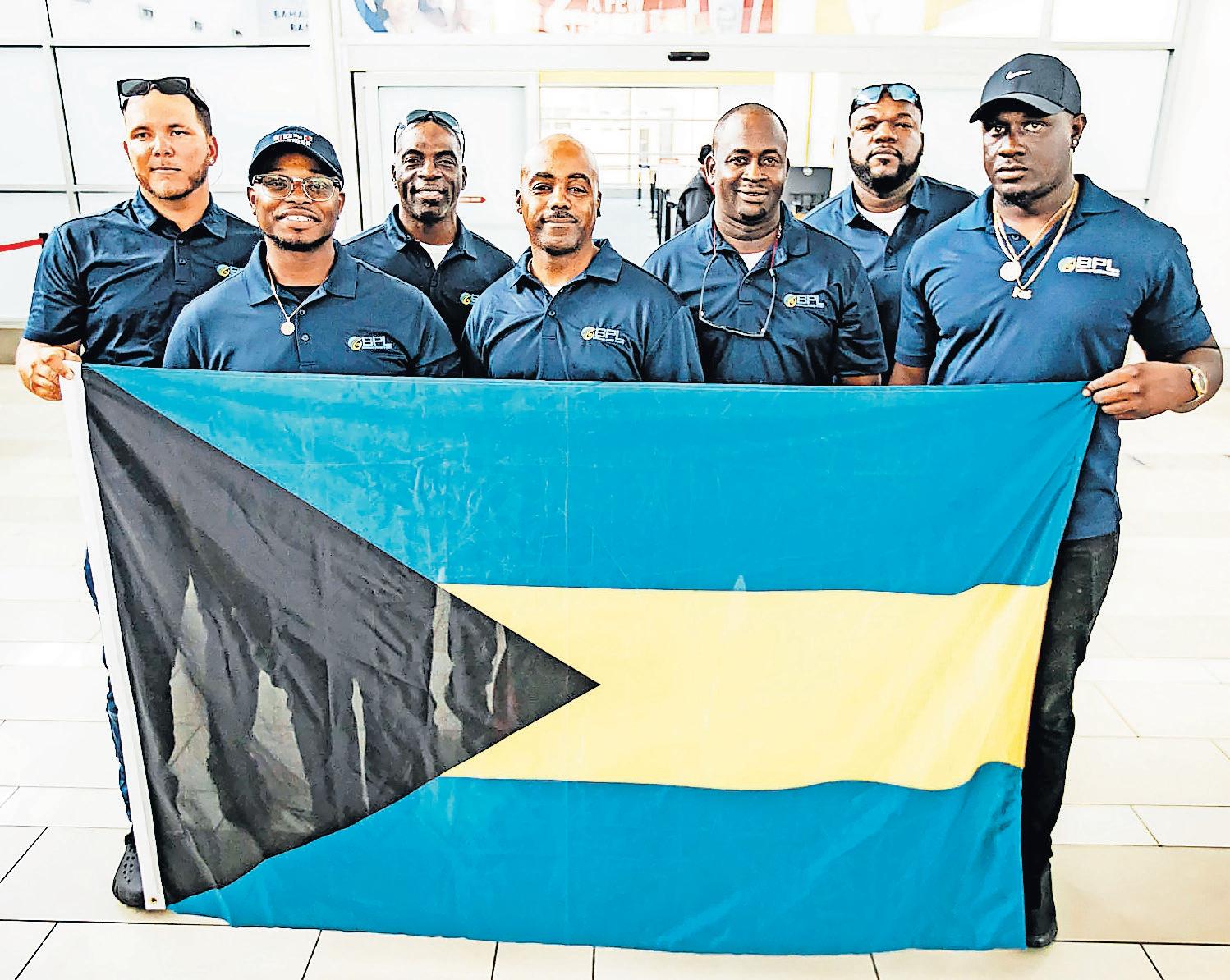
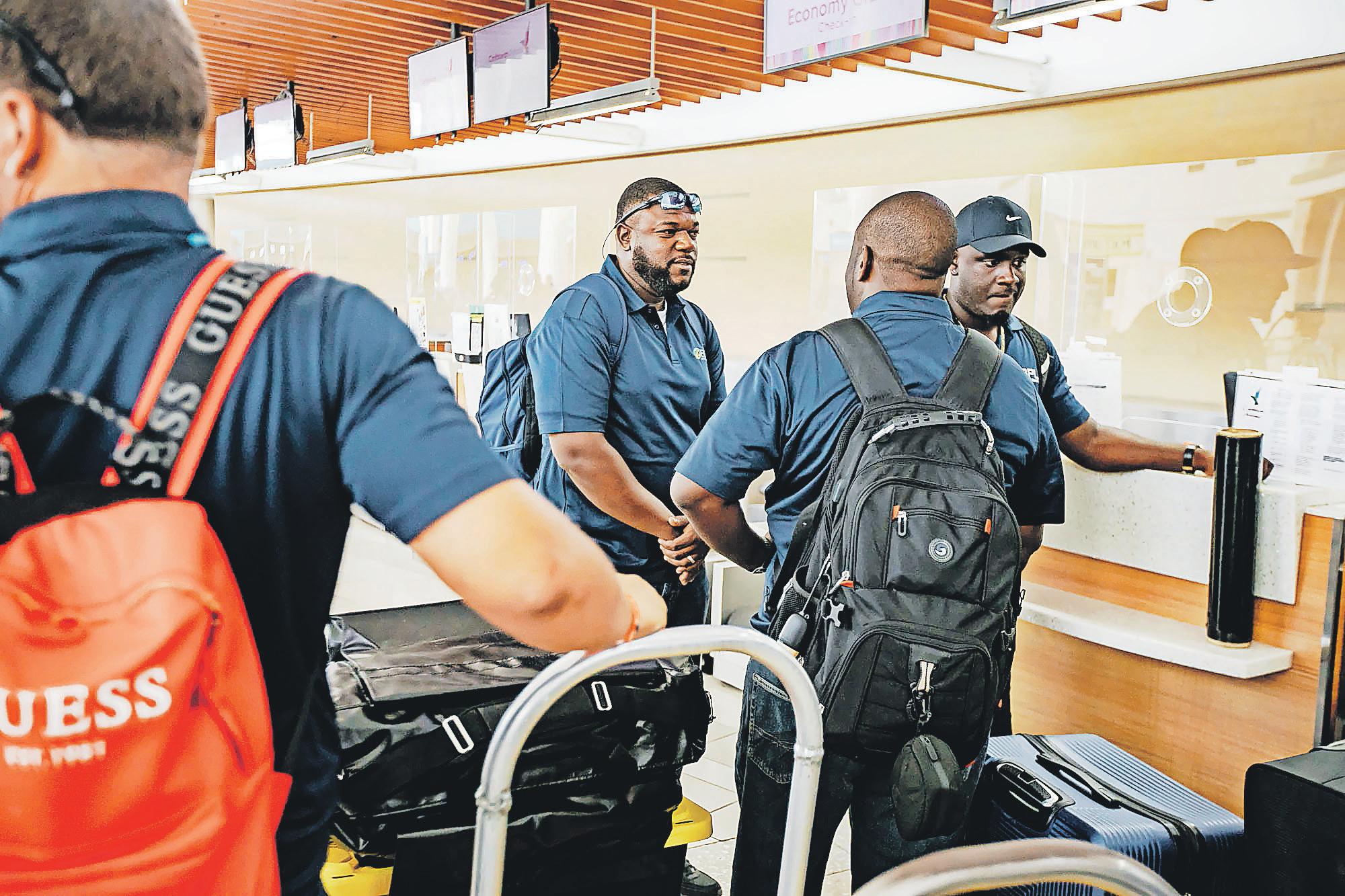
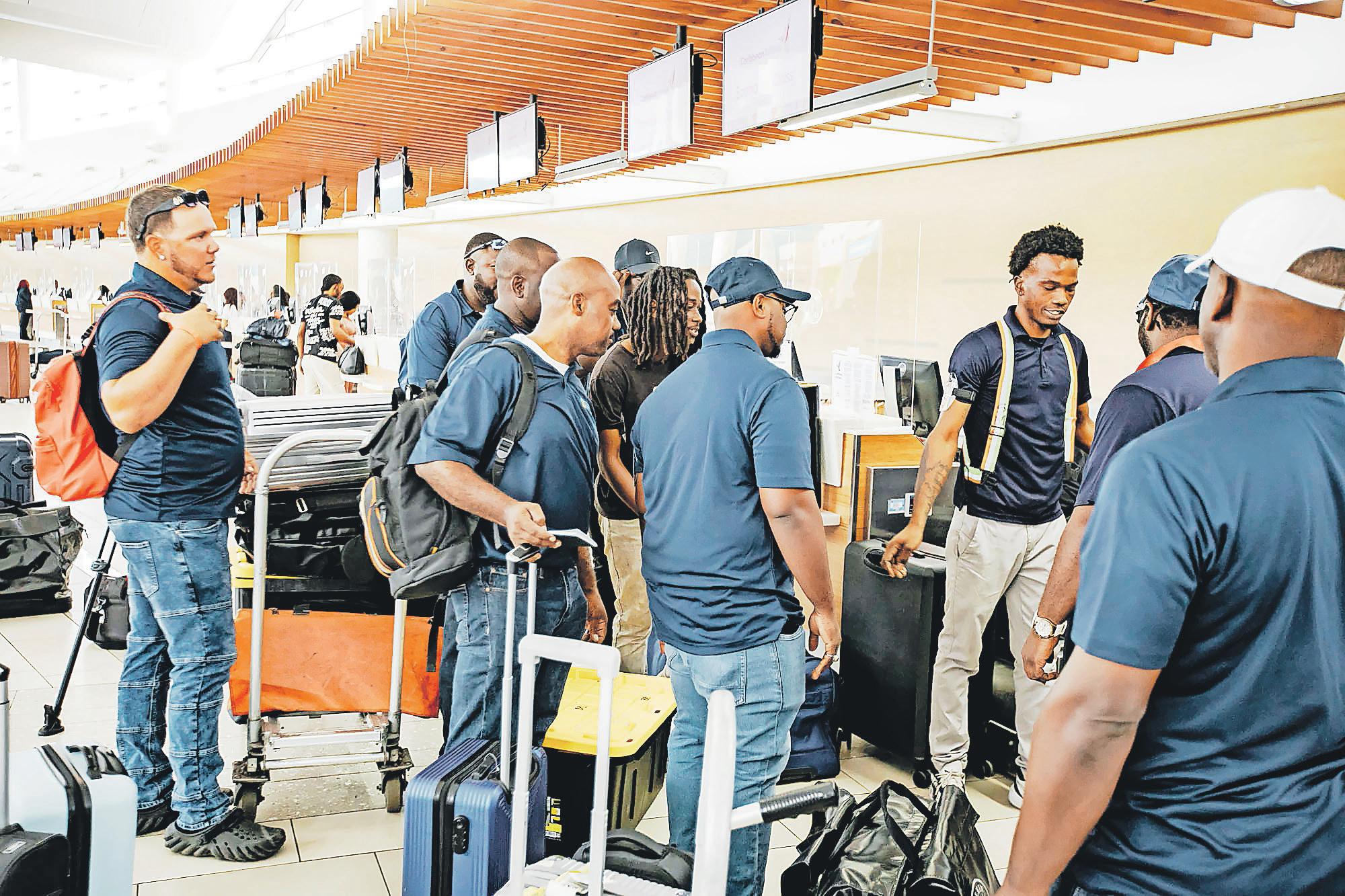
American man bitten by seven-foot reef shark while spearfishing near Chub Cay
A 24-YEAR-OLD American man required seven stitches after being bitten by a seven-foot reef shark while spearfishing off Chub Cay in the Berry Islands on Sunday — the latest in a string of shark-related incidents involving US visitors in Bahamian waters this year.
Daniel Alden Yi Chung Yang of California was attacked around 12.30pm, about 30 miles east of Chub Cay, after spearing a fish. As he pulled the catch toward himself, the shark lunged and bit his right arm, leaving a deep laceration, The Tribune understands.
Mr Yang managed to return to his vessel, the Cofina, where a nurse treated and administered seven stitches. Police said he did not require further medical care and was discharged in stable condition.
The incident follows
several others involving American tourists, including a 63-year-old man injured while spearfishing off Big Grand Cay, Abaco, in August, and two women bitten while swimming in Bimini Bay in February. Those attacks prompted the US State Department to warn travellers in March to exercise increased caution in Bahamian waters due to crime and shark encounters. Data from the International Shark Attack File shows fewer than 50 unprovoked shark attacks worldwide in 2024, below the ten-year average of about 70, though The Bahamas remains among the countries with the highest number of recorded cases. Experts, however, stress that such incidents are rare compared to the millions who visit or dive in its waters each year.

BPL WORKERS waiting to board a flight to Jamaica to assist in their recovery efforts after the passage of
Judge rules Symonette not given chance to appeal before dismissal
DISMISSAL from page one
Last month, former Royal Bahamas Defence Force chief petty officer Darrin Alexander Roker, 56, pleaded guilty in a New York court for his role in the scheme and faces up to 20 years in prison.
It is unclear whether Mr Symonette has been the subject of any extradition request proceedings related to that case.
According to court documents, Mr Symonette, represented by attorney Bjorn Ferguson, said he was summoned to a meeting at police headquarters by the then-Commissioner, where he was stripped of his warrant card, firearm certificate and service weapon before being handed a discharge certificate dated December 2 — ten days before the meeting occurred.
In his affidavit, Mr Fernander said Mr Symonette’s one-year contract had expired and that senior executives unanimously decided not to renew it because of the controversy surrounding the US indictment. He said the decision was made because the allegations against the officer had created “negative public views directed at the Police Force.”
However, Justice Bazard noted that both sides agreed no hearing had taken place and that Mr Symonette was not given the opportunity to appeal before being dismissed. The judge said
there was a clear statutory framework requiring officers to be given notice and a chance to respond before being discharged for inefficiency or public interest reasons.
Citing Regulation 42 of the Police Disciplinary Regulations, she said the Commissioner was required to first report the matter to the Secretary to the Cabinet, who would then inform the officer in writing and allow him to show cause why he should not be dismissed. Only after this process could a recommendation for discharge be made to the Governor General. Justice Bazard found that this procedure appeared to have been ignored. She referred to the landmark 1964 English case Ridge v Baldwin, in which the House of Lords ruled that a police officer’s dismissal without a hearing was void for violating natural justice.
“The First Defendant was bound to observe the principles of natural justice by giving him an opportunity of being heard, and they had not done so,” Justice Bazard said, quoting from Ridge v Baldwin. “This condition precedent goes to the heart of the matter.”
The judge noted that the decision to discharge Mr Symonette seemed to have been made in advance of the meeting, as the discharge certificate was already stamped and dated ten days earlier.
She also observed that while the Commissioner had described the officer’s service as
“The First Defendant was bound to observe the principles of natural justice by giving him an opportunity of being heard, and they had not done so,” Justice Bazard said, quoting from Ridge v Baldwin. “This condition precedent goes to the heart of the matter.”
“unsatisfactory,” there was no evidence that any formal disciplinary process had been initiated or
that the officer had been notified of charges against him.
Government lawyers argued that Mr Symonette had an alternative remedy under Section 21(2) of the Police Act, which allows an aggrieved officer to appeal to the Governor General within seven days of dismissal. They said he should have exercised that option before turning to the courts.
But Justice Bazard found there were “exceptional circumstances” justifying judicial review, saying the Commissioner’s failure to follow the statutory and procedural requirements could render the dismissal “a nullity.”
“I am satisfied on the evidence before me that there is an arguable case that the claimant was not afforded due process and the decision itself may have been taken without proper regard for the First Defendant’s obligations,” she wrote. “On the face of it, it appears that the First Defendant paid no heed to his statutory obligations.”
She ruled that the case met the threshold for judicial review and that the delay in filing — four months after dismissal — was within the six-month legal limit.
Mr Symonette, who joined the RBPF in July 1994 and became pensionable in 2019, is seeking declarations that his dismissal was unlawful and unconstitutional, along with compensation for loss of salary since December 2024.
Murder victim’s friend testifies in shooting trial
By PAVEL BAILEY Tribune Staff Reporter pbailey@tribunemedia.net
A MAN who survived a shooting incident that claimed his friend’s life told a Supreme Court jury yesterday that he watched the gunman press a weapon to his head before opening fire, as the trial into the 2022 murder of Emmanuel “Manny” Brown began before Justice Jeannine Weech-Gomez. Prosecutors allege that Donte “Drey” Deveaux, 28, shot and killed Brown and attempted to kill Samuel Joseph on Seventh Street, Coconut Grove, on the night of May 2.
Mr Joseph testified that he and Brown were sitting in the yard of a wooden car wash when Deveaux approached and asked to borrow $10. He said he handed the money over, and the man walked away, only to return about ten minutes later to repay him.
As he escorted Deveaux back to the front of the property, Mr Joseph said he suddenly felt the barrel of a gun pressed against his temple.
He told the court he turned to see the defendant standing beside him and heard him ask “what you be dealing with” before the gun went off. Mr Joseph said he was shot in the jaw and ran, holding his wound, as the attacker continued firing.
He said he saw Brown fall to the ground behind an unfinished building and that when he regained consciousness moments
later, Deveaux was standing over Brown’s body.
Mr Joseph demonstrated to jurors how he shielded his head before being shot again, suffering additional wounds to his arm and hand.
Police arrived quickly, he said, and he identified Deveaux to one of the first responders, an officer he knew named Sands. He told the court that paramedics later said he had been shot six times.
Mr Joseph, who wore dark glasses in court and needed help to take the stand, said a bullet entered the back of his right eye, forcing doctors to remove part of it. He is now blind in that eye and said his vision in the left eye is blurred.
He testified that he had known the defendant for 16 years, having been friends with his late uncle and visiting the family’s Eighth Street home often.
Mr Joseph said he picked Deveaux out of a photo lineup, identifying him as suspect number nine, and also pointed him out in court.
Photographs of the crime scene showed a domino table and the body of the victim lying outside the car wash. Mr Joseph confirmed that the photos matched what he saw that night.
During cross-examination, defence attorney Dr K Melvin Munroe pressed Mr Joseph about inconsistencies between his police statement and his court testimony, including his failure to mention that the gun had been placed against his head.
Mr Joseph conceded that parts of his earlier statement were inaccurate but insisted his present account was true.
He said he could not recall how long he was unconscious but believed it was brief because the shooter was still on the property when he awoke. He also said he did not see Brown get back up or check on him after the shooting.
When Dr Munroe suggested he was mistaken
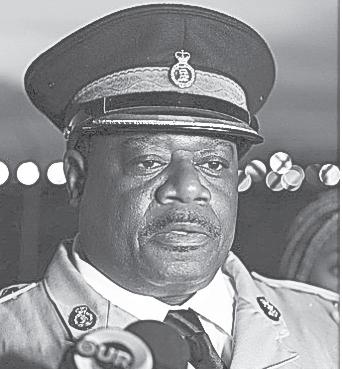

about the gunman’s identity, Mr Joseph replied that Deveaux was the man who shot him and killed Brown, adding that he had no reason to lie. He told the court he had been wearing an electronic monitoring device at the time of the shooting and previously served time in prison for armed robbery and receiving.
Calnan Kelly, Tenielle Bain, and Timothy Bailey represented the prosecution.

DARRIN ALEXANDER ROKER
ELVIS CURTIS
Gibson: DRMA failed to deliver hurricane relief
By EARYEL BOWLEG Tribune Staff Reporter ebowleg@tribunemedia.net
LONG Island MP Adrian
Gibson has accused the Disaster Risk Management Authority (DRMA) of neglecting residents in need of hurricane relief, calling the failure to deliver supplies to the island “disgraceful”, “deeply disappointing” and “unacceptable.”
In a Facebook post, Mr Gibson said he donated tarps to Island Administrator Jandile Archer, with Royal Bahamas Defence Force officers present, to help residents whose homes were damaged by Hurricane Melissa.
He said the island continues to face a shortage of tarps, construction materials, and other essential supplies needed for recovery.
“I am advised that yesterday morning, another RBDF vessel arrived at the dock to drop off officers to undertake further home/building assessments and, once again, no hurricane relief supplies were sent by the Disaster Risk Management Authority (DRMA) — despite repeated assurances that aid would be delivered to Long Island,” he said.
“This is disgraceful,
deeply disappointing and completely unacceptable. Our people deserve timely and adequate support in this recovery period.”
DRMA executive chairman Alex Storr said yesterday that officials are working with the island administrator to confirm what is needed and plan to send supplies soon. He added that RBDF officers are already on the ground and may be carrying out repairs, though he could not say when the relief items will arrive.
“We've already done Rapid Assessment two days after the storm, and this will now be to look at residences and everything else to see what needs to be done,” Mr Storr said. “But supplies will be going down as well, the basics you are sure to need, like tarp and other things. But we will actually be doing an on-the-ground assessment this week.”
Hurricane Melissa, which struck The Bahamas in late October, was one of the most powerful storms to ever hit the region. The system developed rapidly over the Caribbean Sea before slamming into Jamaica as a Category 5 hurricane on October 28, devastating
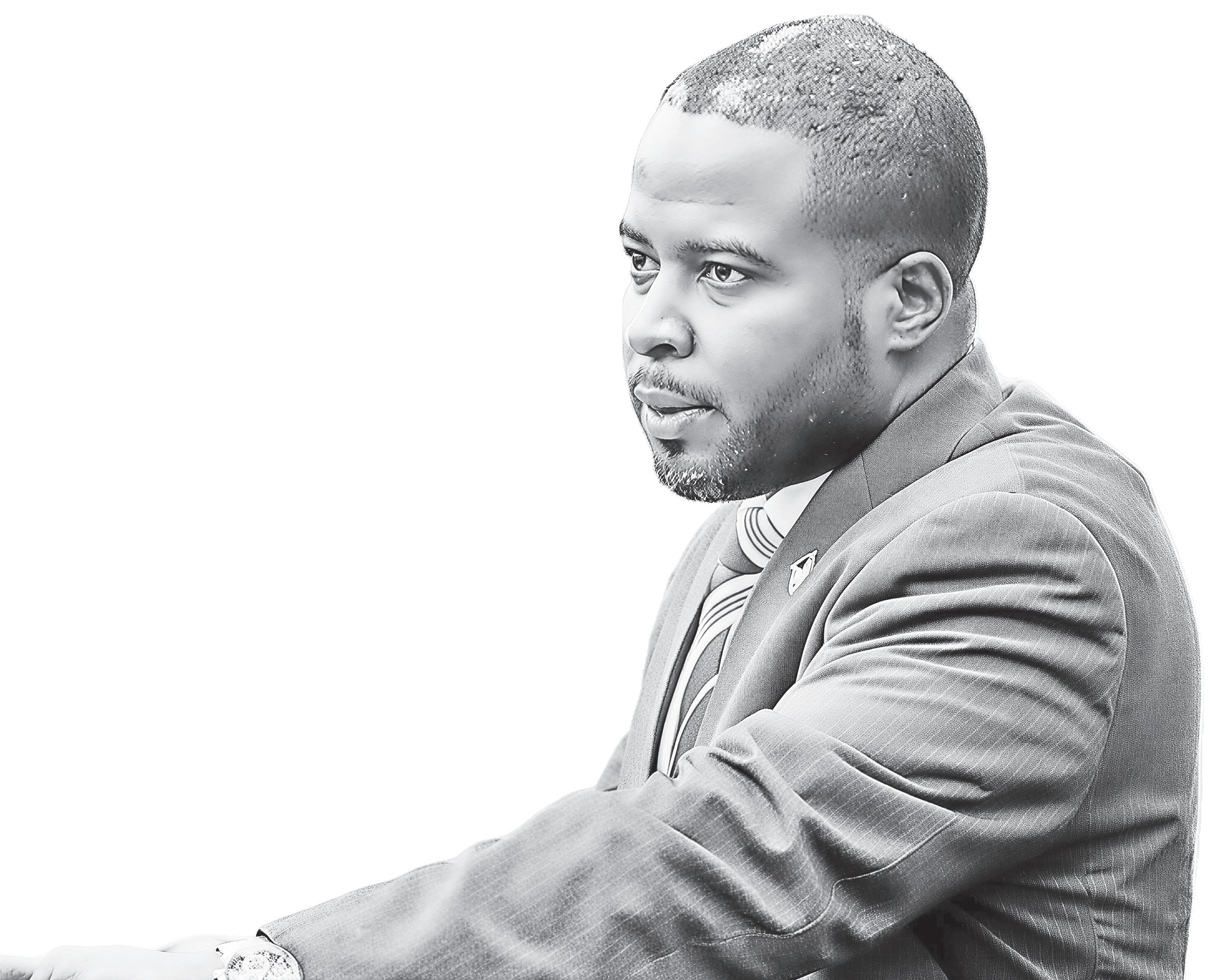
communities there and leaving at least 40 people dead across the region. After crossing eastern Cuba, the storm passed through the southern Bahamas with hurricane-force winds, heavy rain, and severe coastal flooding that damaged homes and infrastructure on several islands, including Long Island, San Salvador, and Cat Island.
In Long Island, Melissa tore roofs from houses, uprooted trees, and downed power lines, leaving large sections of the island without electricity for days.
Many residents have struggled to secure basic supplies such as tarpaulins and building materials as they work to repair their homes.
Local officials have warned that the prolonged lack of assistance could worsen living conditions for families whose properties were severely damaged.
The government declared several southern islands disaster zones after the storm, while the Royal Bahamas Defence Force was deployed to help with assessments and recovery.
Family frustrated over what they say is a lack of urgency by the police
heals,” she told The Tribune yesterday. “We are praying. We hope that she would
return to us alive, and if she is deceased, we would just want her body to (have) a proper burial.” Ms Woodside was last seen on August 11, 2022.
She told her mother she would return home by 6pm, but she never did. Residents said they saw her walking along Lincoln Boulevard towards Washington Street,
where she lived, but she never arrived.
Ms Ferguson said someone told their mother they saw Ms Woodside get into a car with a person who offered her a ride. She believes that person was not a stranger and may be responsible for her disappearance.
multiple searches over the past three years, combing empty lots, abandoned buildings, and cemeteries after a tip claimed her remains had been left in one. Nothing was found.

The family’s frustration has deepened over what they describe as a lack of urgency from the Royal Bahamas Police Force. Ms Ferguson said that, besides issuing a missing flyer, officers made little effort to locate her sister or follow up on possible leads. “They have not been telling us anything,” she said. “When they discover bodies, we would go and inquire if maybe we can identify the body, see if it’s her. They showed no interest. It’s just like they didn’t care.”
Ms Ferguson described her sister as educated, kind, and street-smart — someone who would not have accepted a ride from anyone she did not trust. She said any possible motive could stem from jealousy or a personal dispute involving a friend or ex-boyfriend.
The disappearance is not the family’s first tragedy. In 2017, Ms Woodside’s brother was killed, leaving behind two children who still ask for their missing aunt. “How do we look at innocent children in their faces and tell them auntie is not coming home? We don’t know where auntie is?” Ms Ferguson said.
the United States at the time but returned to New Providence after her sister went missing. She said Ms Woodside had big dreams; she was planning to open a clothing store and car rental company and was working toward returning to school. “She wanted to go back to school,” she said. “That was one of her next goals that she had, and she was really striving.”
Each year on the anniversary of her disappearance, Ms Ferguson revisits her sister’s belongings, pictures, and memories, trying to keep her spirit close.
Three years later, the family continues to retrace her last steps and call for the police to do more. Despite the silence, they say they will not give up — holding onto faith and hoping one day for closure. MISSING from page one
The family has conducted
She had been living in

LONG ISLAND MP ADRIAN GIBSON
Public healthcare ‘is taking a hit’
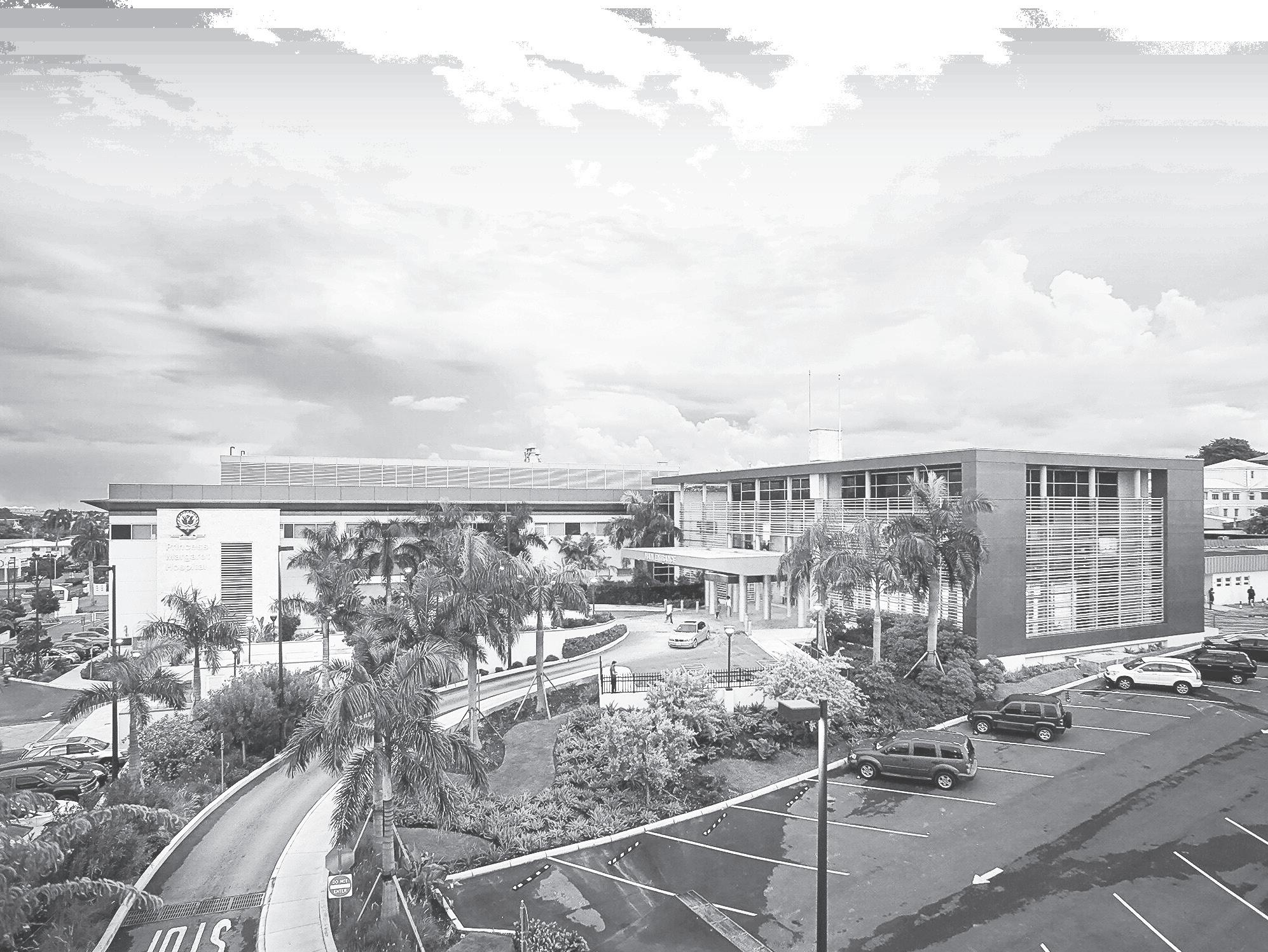
Muriel Lightbourn, who said more than 50 nurses have left the public healthcare system in the past three to four months. Ms Lightbourn said the union is pushing for improved benefits and working conditions to stem the loss of trained professionals.
Just last week, senior nurse Pearl Williams, a 44-year-veteran, was suspended after posting a video lamenting leaking roofs, rodent infestations and supply shortages at Princess Pargaret Hospital.
The latest figures reveal the nursing shortfall appears to be worsening.
Health and Wellness Minister Dr Michael Darville said last year that the system was short 450 nurses, later claiming this year that the figure had dropped to about 200 — a number the union disputed. Dr Rolle’s
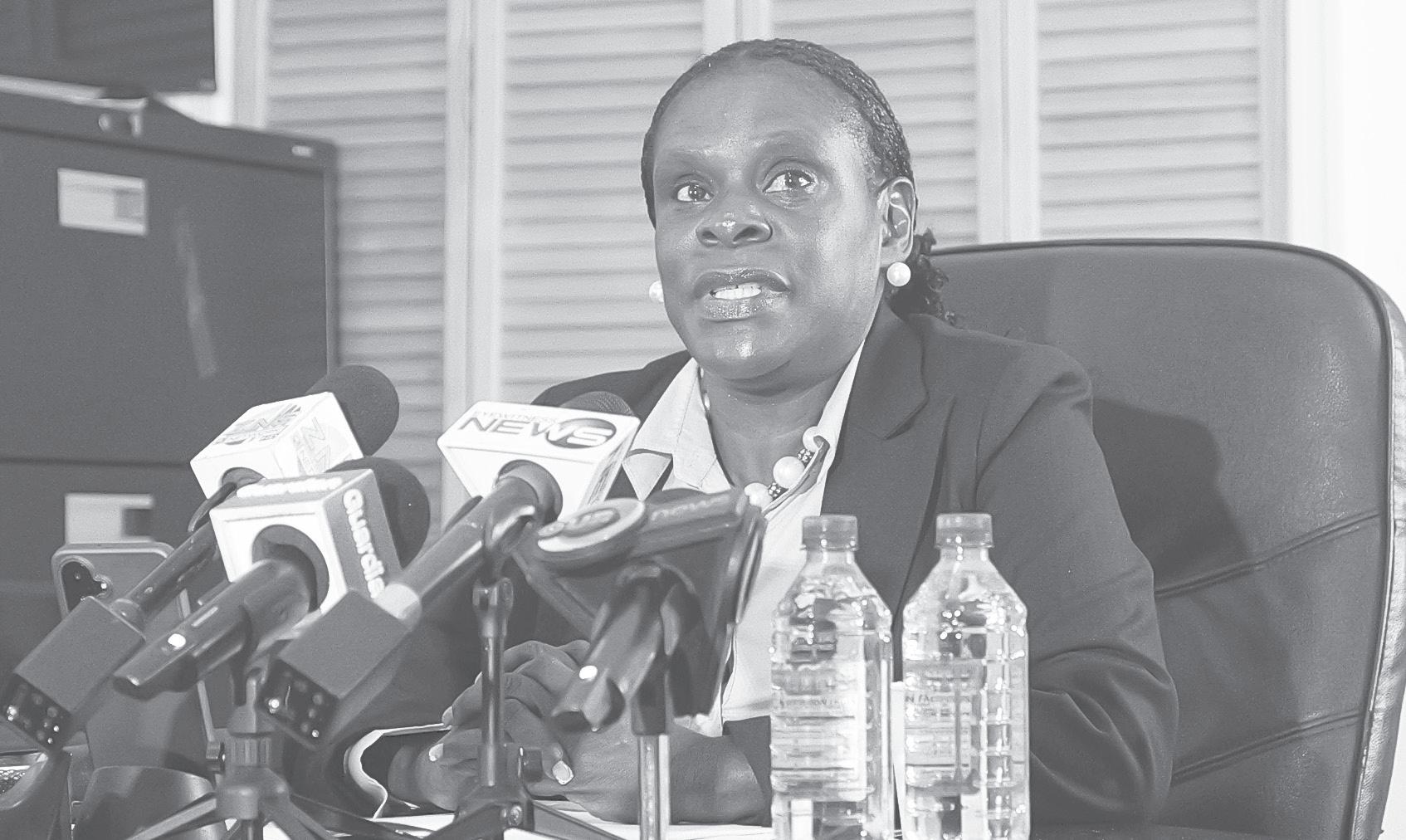
assessment now places the gap even higher. Dr Rolle said the most acute shortages are in specialist areas, including intensive care, neonatal care, midwifery, and dialysis.
She said the public healthcare system “is taking a hit,” adding that officials are developing new training modules for NAECOB approval to ensure continued professional
training through the PHA’s academy.
She noted that PMH has been operating at full capacity since the pandemic, with its normal 405-bed count expanded
through virtual wards to manage patient overflow. She identified three key factors affecting retention: working conditions, access to training, and staff treatment. She said morale has declined since the COVID19 pandemic, with many nurses losing relatives and colleagues but never getting time to grieve because of chronic understaffing.
“We’ve put together spaces where persons could go and speak to psychologists and stuff if they need it,” she said. “We’ve had meetings. I’ve also had training with leaders talking about how they treat people, etc.
“We’ve rebranded. The first P is people, and I always remind leaders that as we care for patients, we also have to care for staff, because they’re the people as well, and so we’re really trying to do our best. I think we need to work a little more to make it happen.”
Dr Rolle also addressed persistent complaints about long wait times at Princess Margaret Hospital, saying officials are working to improve patient experience. She said the PHA has created a Patient Experience Department to help patients and families navigate the system and improve communication with physicians.
“The intent is to have persons moving around, helping and being that middle person to have the communication between the physician and the family member and the patient, so we can alert them to what’s going on,” she said.
Dr Rolle insisted that the authority is not “sleeping” on complaints about staff behaviour, communication, and patient care, but cautioned that lasting improvements will take time.
BNU chief accuses Darville of hypocrisy on ministry’s handling of suspended nurses
By LEANDRA ROLLE Tribune Chief Reporter
lrolle@tribunemedia.net
BAHAMAS Nurses
Union President Muriel Lightbourn yesterday accused Health and Wellness Minister Dr Michael Darville of hypocrisy over his ministry’s handling of suspended nurses, as she revealed that more than 30 public health nurses have been suspended since she took office in 2023.
She said some suspensions were as recent as three weeks ago, when three nurses were placed on leave but have since returned to work.
Speaking at a press conference, Ms Lightbourn criticised what she described as excessive disciplinary measures within the Public Hospitals Authority (PHA) and questioned Dr Darville’s sincerity after he expressed concern about the suspension of veteran nurse Pearl Williams. She called his remarks “disingenuous,” recalling that he remained silent when other nurses were sent home for what she described as minor offences.
Ms Lightbourn said the PHA's disciplinary system is deeply flawed and called for reforms to ensure greater fairness and efficiency. She said the union intends to revisit its industrial agreement to address the issue and prevent similar cases in the future. Her comments come
amid public attention over Ms Williams’ case. The 44-year veteran was suspended for recording a video highlighting leaking roofs, rodent infestations, and supply shortages at Princess Margaret Hospital. The PHA accused her of breaching its social media policy and reportedly instructed her not to travel, not to enter the hospital except for medical care, and to surrender her identification badge.
Ms Lightbourn said the suspension was excessive, even though the staff member had breached policy, adding that such punishments place an unnecessary burden on already strained hospital resources.
“While he is saying that he feels this is unfair, I have represented nurses from the Department of Public Health, where they were sent home without following the procedure,” she said. “Their rights to natural justice were ignored totally. These nurses were sent home, even though our industrial agreement says that they had to go through the disciplinary process before being suspended for a certain time.”
She added that investigations often drag on longer than necessary, resulting in repeated extensions of suspensions that could otherwise be avoided. In many cases, she said, a simple warning or relocation to another area would be sufficient.
“I have suggested that instead of suspending these persons, you could remove them to another area,” she said, “because when you suspend this nurse and you remove her from the ward, from the hospital for ten days, that means now that you have to find another nurse to fill in a space you're paying that nurse overtime. And guess what? Who loses? The hospital.”
Dr Darville pushed back, saying that as minister, he is not directly involved in all human resources matters. He said staff are suspended for various infractions, adding: “We have a ministry to run and when people violate, we need to respond. So, I beg to differ with her. That’s her opinion and I respect her opinion but she’s completely wrong.”
Ms Lightbourn also called for greater transparency in disciplinary matters, saying nurses are sometimes sent home under strict restrictions without being informed of the outcomes of their investigations. She said she has repeatedly raised these concerns with the disciplinary committee and Human Resources.
Defending her leadership, Ms Lightbourn said her preference for handling matters privately should not be mistaken for inaction. “Because I don't grandstand sometimes, or most of the times, doesn't mean that my voice is not
heard,” she said. “I could come to the table. Decisions are made at the table. I’m not going to go out

there unless it is necessary.”
Ms Williams told The Tribune she has no plans to pursue legal action but
hopes her case prompts authorities to address the underlying concerns she raised.
PUBLIC Hospitals Authority Managing Director Dr Aubynette Rolle speaks at a press conference yesterday.
Photo: Nikia Charlton
The Tribune Limited
NULLIUS ADDICTUS JURARE IN VERBA MAGISTRI
“Being Bound to Swear to The Dogmas of No Master”
LEON E. H. DUPUCH,
Publisher/Editor 1903-1914
SIR ETIENNE DUPUCH, Kt., O.B.E., K.M., K.C.S.G., (Hon.) LL.D., D.Litt .
Publisher/Editor 1919-1972
Contributing Editor 1972-1991
RT HON EILEEN DUPUCH CARRON, C.M.G., M.S., B.A., LL.B.
Publisher/Editor 1972-
Published daily Monday to Friday
Shirley & Deveaux Streets, Nassau, Bahamas N3207
TELEPHONES
News & General Information
(242) 502-2350
Advertising Manager (242) 502-2394
Circulation Department (242) 502-2386
Nassau fax (242) 328-2398
Freeport, Grand Bahama (242)-352-6608
Freeport fax (242) 352-9348
WEBSITE, TWITTER & FACEBOOK
www.tribune242.com

@tribune242 tribune news network

Nurses and the nation deserve better
WHAT is going on with the shortfall in our public workers?
Back in July, Police Commissioner Shanta Knowles declared that the Royal Bahamas Police Force needed 2,000 more officers to effectively police the nation.
National Security Minister Wayne Munroe blamed the situation on a combination of hundreds of officers being on indefinite sick leave, limits on training capacity, and too few qualified applicants – the latter an indictment on our education system as much as anything else. About ten to 15 percent of the force was said to be on extended sick leave.
As for our healthcare system, the managing director of the Public Hospitals Authority, Dr Aubynette Rolle, yesterday said the country has a shortfall of about 500 nurses.
If that sounds bad, it is actually a situation that is getting worse, not better. Last year, Health and Wellness Minister Dr Michael Darville said the system was short 450 nurses, but later said that number had dropped to about 200. The union disagreed with that, saying the number was double. Whoever was right about the numbers then, the figure is higher now – and by some margin.
Staff morale has long been an issue – so this should not come as a surprise.
Back in August 2023, Bahamas Nurses Union president Muriel Lightbourn warned over poor working conditions as staff walked off the job. She said nurses were exhausted and fed up.
The Tribune has heard often about the poor state of parts of Princess Margaret Hospital and of various clinics – but when a senior nurse dared to speak out about it in a video talking about leaking roofs, a shortage of supplies and an infestation of rats, what happened? The authorities shot the messenger rather than listen to the message.
Pearl Williams was suspended after the video – despite her being a 44-year veteran of the nursing profession. Do authorities really think someone who has dedicated more than four decades to caring for people was ready to throw it all away over a video?
Health workers have talked again and again about their frustrations – only for there to be little response at times to their concerns.
Sources at the hospital have warned of poorly kept equipment too – with valuable medical tools abandoned in cupboards or not maintained as necessary. And over and over, we hear of the government being late to pay providers for NHI coverage. Those providers have bills to pay too – they cannot be late, so why can government keep them waiting?
Nurse Williams is not alone in her frustration. Ms Lightbourn warned last week that over recent months, 50 nurses have left the public healthcare system.
The government talks about trying to keep Bahamian nursing staff here rather than them going to work in the US – but that is not going to happen while such frustrations are evident.
Instead, Health Minister Dr Darville has presided over an increase in the shortfall rather than closing the gap.
To be clear, that means there already were not enough nurses to care for the Bahamian public, and whatever efforts there have been to recruit more, either they are not working or the exodus of established staff is increasing. That means not enough staff to care for you, me and everyone. The ones who lose out most are the ones in need of care.
And if all that is not enough, the government is going ahead with plans to build a new $267m hospital with more than 300 beds. As Ms Lightbourn asked back in July, “Where are you going to find the staff?”
And if we add 500 more staff – before whatever is needed in that new hospital – and 2,000 police officers, what is that going to do to the budget for paying public workers?
Let us be honest about this – those shortfalls are still going to be there come the election. As it stands, this administration’s efforts at recruitment and retention are seeing things get worse rather than better. What promises can this government make that will encourage voters to believe their next term in office will be better than this one should they win?
In November last year, Prime Minister Philip Davis said he was committed to finding a solution to the problem of nurse retention. He clearly has not found one.
Our nurses deserve better than to work in dirty surroundings with leaking roofs and plagued by rats, all for low pay that they could better by going to work elsewhere.
Time and again, nurses have said what the problem is, but it seems people are not listening. Is it any surprise Nurse Williams was moved to record her plea in the hope someone might hear. Instead, she found herself shut out. By the numbers, this administration is failing to address the needs of both nurses and the nation. The likes of Nurse Williams should be championed rather than silenced. Rather than talking about suspensions, let us talk about the plan. How does it get better, and when will the shortfall be closed? Answers, please.
Golden Isles is ready for change
EDITOR, The Tribune. FOR far too long, the residents of Bozine Town Drive, Bozine Drive, and the street opposite Bozine Town Park have been living in complete darkness; both literally and figuratively. Several of the streetlights in this area have been out of order for years, leaving families, seniors, and children exposed to unsafe conditions every single night. Despite numerous complaints made to the government, the issue remains unresolved. The promises to “look into it” and “get it fixed soon” have faded into silence while the lights remain off and the community continues to suffer. This area, identified by coordinates 25.04308° N, 77.37013° W, is one of the
PICTURE OF THE DAY

Have a cool, fun, interesting, amazing photo? Have it featured here in The Tribune’s picture of the day! Email your high quality image to pictureoftheday@tribunemedia.net

Asking for a chance to serve
EDITOR, The Tribune.
When I was nineteen years old, I was a busboy. Some days I swept floors, other days I washed dishes, and every day I dreamed that life could be better. I didn’t come from wealth or influence. What I had was faith, hard work, and the words my grandmother always told me “Keep your word, stay humble, and never forget where you came from.”
darkest and most unsafe spots in the Garden Hills Constituency. Now, the same issue is spreading to Cereus Avenue, where a light has been off for months despite repeated reports. Coordinates: 25.04446° N, 77.33897° W.
This isn’t just an inconvenience; it’s a public safety concern. Without proper lighting, visibility is poor, the risk of accidents and crime increases, and residents feel abandoned by the very leadership elected to serve them. Garden Hills deserves better. We deserve a government that listens, acts, and delivers, not excuses and neglect. The darkness that linger over Bozine Town and other parts of
Garden Hills symbolises more than just burnt-out bulbs, it reflects the lack of care and urgency from those responsible for maintaining our community’s safety. We ask the Member of Parliament for Garden Hills and the Government of The Bahamas to take immediate action to restore lighting across our community. The time for talk has long passed. Our people deserve results. Garden Hills is ready for change. And whether they fix the lights or not, one thing is clear: unstoppable change is coming - a change that works for you.
D’ANGELO FERGUSON Nassau, November 5, 2025.
There were days I wanted to give up. I worked as a janitor, scrubbing floors after long shifts. Then came a break the chance to study law. To afford it, I worked nights as a security guard. I remember those lonely nights, standing under a flickering light, trying to stay awake while reading my textbooks. I wasn’t just chasing a degree. I was fighting for a future that didn’t seem made for people like me. My story is the story of many Bahamian families who keep this country going the hotel workers, the bus drivers, the cashiers, the fishermen, the teachers, the nurses. It’s the story of mothers who get up before sunrise, fathers who work two jobs, and grandparents who stretch their pensions to help their children get by. It’s the story of ordinary people doing extraordinary things every single day just to hold their families together.
I am running because I believe in the power of hard-working Bahamians. I believe that if we build together, we can make
life a little easier, a little fairer, and a lot more hopeful for families who deserve better.
Over the past few years, our country has started to move forward again. This government has created new jobs, raised the minimum wage, introduced free school breakfasts, and reduced Value Added Tax (VAT) to make life a little more affordable for working families. We’ve seen major investments in education, training, and small business development and more Bahamians are finally getting the opportunities they deserve. But we all know there’s still more to do. Progress has started now we must build on it and make sure it reaches every home, every worker, every family.
That’s why I’ve put forward a plan for Golden Isles. I want to build a Golden Isles Community Centre where families can gather, seniors can stay active, and young people can learn new skills. I want to start a Youth Mentorship and Leadership Network to help our children find their path and launch a Micro Fund to help small business owners and entrepreneurs get started. I want to expand my free online tutoring initiative, Student Head Start to include other BJC and BGCSE subjects. I want to launch my literacy initiative, Read
Across Golden Isles and work with the community to implement, Stars of Golden Isles, an initiative to reward and celebrate the successes of students living in Golden Isles. I want to use my 6 Point Plan to partner with Adelaide Primary to continue the school’s excellent GLAT performance. And I want to launch the Golden Isles Skill and Opportunity Registry to encourage employability and skill development. I will fight for better roads, brighter streetlights, safer neighborhoods, and more spaces for our children to play and grow. And when issues arise, I’ll be right there through a Constituency Help Desk and Rapid Response Team to ensure that issues and concerns are addressed expeditiously.
All I’m asking for is a chance and the trust of the voters of Golden Isles. Give me the chance to serve you - to fight for your children, your household, and your future. If you give me that chance, I’ll never forget who I’m working for. I’ll be in your corner every day, listening, helping, and pushing for progress. I will remain focused because I know what it means to start with nothing and still believe in something.
I’m asking for the trust, support, and vote of the people of Golden Isles.
DARRON PICKSTOCK Nassau, Bahamas November 10, 2025
A PASSING storm while sailing in The Bahamas.
Photo: Curtis
‘Never the intent of Port Department to victimise anybody’
Jr, owner of 10 Summaz Adventures, who said his troubles with the authorities began in 2017 after a viral incident in which he was slapped by a police officer at Paradise Island Beach.
Since then, he claims, he has faced near-constant interference from joint task forces and port officials.
He said the harassment began in 2023 and intensified by mid-2024, claiming officials used his Florida record to justify actions against him in The Bahamas and constantly found new reasons to seize his jet ski.
He said the scrutiny has become personal.
“Honestly, sometimes when I wake up, I don’t even have the strength to go to work,” he said. “The whole weekend, I didn’t even go to work. But I knew after that video, they were going to send someone to harass me.
On Monday, police even grabbed my brother, thinking it was me, and took him to the station.”
The video, which went viral, showed Mr Deveaux having a tense interaction with several Port officials, including Mr Wright.
His father, Reno Deveaux, a 45-year veteran of Cabbage Beach, said he too believes he has been blacklisted for speaking out. He said he repeatedly
sent photos of unlicensed banana boat operators to the Port Department — including Mr Wright and Senior Deputy Port Controller Craig Curtis — but never saw action taken.
“Some people, many good people, gone out of business, because no one to turn to fix the problem,” he said.
“That’s so bad, it’s terrible.”
Mr Curtis, speaking on behalf of the department while Mr Wright is off-island, dismissed the accusations as false. “It is never the intent of the port department to victimise anybody, but simply to ensure that everybody is in accordance with the rules and regulations that govern the industry,” he said.
He said the department began issuing citations on July 1 2025, to tighten oversight of jet-ski and watercraft operators. “Since July 1 2025 the port department has now been able to issue citations, and with these citations comes a lot of rules and regulations that these jet ski operators and owners are not accustomed to following and abiding by and having fines affixed to these penalties now,” he said, arguing that those who “cry foul” often fail to meet the department’s licensing requirements.
At Cable Beach, operator Derlano McMinnis, 28, owner of Aquanaut Adventures, said he was pressured into joining the Cable
Beach Association to continue working. “They pretty much make us to join this association by saying that if we don’t join, we aren’t able to get jobs,” he said. “The association is only being manipulated to benefit few persons.” He claimed that smaller operators are excluded from meetings and consultation opportunities with port officials, which creates financial strain.
Sterling Martin, 32, owner of SJS Adventures, said repeated seizures of his equipment left him unable to provide for his family. “I couldn’t make my money this year. I wanted to take my son to private school, but in January, everything was changed,” he said.
Mr Curtis said such claims overlook the department’s efforts to maintain fairness. “Those that are crying foul or claiming victimisation, look deep into it and find out why they cannot meet the application requirements,” he said. “We will not victimise anybody,” he said, adding that meetings and forums are regularly held to keep operators informed and involved.
“Anybody who knows me in the industry knows that we exercise discretion. There’s not a jet ski operator out there that can openly say they haven’t been given breaks before. It is not our aim to victimise anybody.”
TROVE OF BAHAMIAN HISTORY TO BE AUCTIONED IN FIRST PUBLIC SALE OF PRIVATE ANTIQUES
By KEILE CAMPBELL
Tribune Staff Reporter
kcampbell@tribunemedia.net
A TROVE of Bahamian history — the first public sale of private antiques from a single Bahamian home — will be auctioned next month at the Baker Estate, a preserved 1920s Colonial residence on William and Shirley Streets once owned by pioneering merchant Anthony Baker.
Set for December 5 and 6, the sale will feature coins dating back more than a century, first-edition Bahamian stamps, antique tools, vintage furniture, fine chinaware, collectible books, vinyl records, and rare pieces salvaged from the historic Windsor Hotel.
The event celebrates the legacy of Baker, a Lebanese immigrant who arrived in The Bahamas in the late 1800s and founded one of Nassau’s first great retail houses, A. Baker & Sons.
Established in 1894, the store began as a small drygoods shop on Bay Street and grew into a cornerstone of commerce, importing fine English goods and revolutionising local trade with large display showcases that
drew crowds to Bay Street’s windows.
Born Thannous Michael Saadi in Hasroun, Mount Lebanon, in 1873, Baker left home at eleven to work in a soap factory in Egypt, then travelled across 45 American states and several Caribbean islands before landing in New Providence in the 1890s. Enchanted by the islands, he stayed, building a business empire and forging close ties with communities in Andros and Eleuthera, where residents affectionately called him “countryman.”
Organisers say the auction doubles as a heritage exhibition, offering a window into how one man’s determination helped shape Bahamian commerce and domestic life.
Calvin Dean, CEO of the Bahamas Liquidation and Auction Centre, said the Baker Estate auction will be the first public sale of private antiques from a single Bahamian home.
“This estate — we have 1920 telephones, 1940s and 1950s SM radios, hundreds of albums from the 1930s straight up to the 1980s, actual furniture from the

Windsor Hotel that was built in the 1940s on Bay Street, and a lot of handmade mahogany furniture from the 1950s and 60s,” Mr Dean said. “We have coins as early as 1843 and first-edition stamps from the 1930s, so all antique collectors, coin collectors, and stamp enthusiasts are invited.”
He said many of the pieces carry personal ties to Bahamian history, including handcrafted works by a former Member of Parliament who died in the 1960s. “We even have scrapbooks from the actual newspapers back then, starting from the 1930s,” he said, adding that more heritage auctions are planned.
A private viewing and early-bidding session will be held on December 5 from 1 to 5pm for registered guests at a $50 entry fee, followed by a public auction on December 6 from 10am to 5pm. The event will be entirely cashless, with card payments only and next-day delivery available for larger pieces.
A digital catalogue will be available to registrants and accessible to the public via QR code.


A nation’s shame: Standing silent while sexual violence thrives
THERE comes a point in every society when silence becomes complicity. When injustice festers long enough, when victims cry out and are met with indifference, and when institutions meant to protect instead excuse and enable, that is when a nation begins to lose its soul. We are there, and the time for action is now.
Sexual and domestic violence, especially against women, remains one of the most degrading, dehumanizing, and terrifying acts a human being can endure. It is not about desire or passion. It is about control. It is about power. It is about the deliberate breaking of another person’s spirit. And yet, despite the lifelong damage it inflicts, our response as a society remains weak, inconsistent, and unforgivably tolerant.
This tolerance not only perpetuates the suffering of individual victims but also erodes the fabric of our culture, undermining our collective sense of safety and justice.
Victims of sexual and domestic violence are screaming at the top of their lungs, and we look the other way until it strikes in our homes, then we want everyone to run to our aid. But we find every excuse to ignore the screams coming from next door. "It's not our business".
In this so-called Christian nation, where we preach love, protection, and moral virtue, how can we accept that the men who violate women’s bodies often walk away with little more than a slap on the wrist? How can we preach redemption while looking the other way at repeat offenders who destroy lives and families?
Let’s be clear: a man who violates another person’s body commits not just a crime against that individual, but a crime against humanity, against all that is decent and sacred. And when our courts treat such acts lightly, they

FACING REALITY
BY IVOINE INGRAHAM
send a chilling message: that a woman’s body, her safety, and her dignity do not matter as much as a man’s comfort, reputation, or potential for “rehabilitation.”
But we know better. Every study, every case, every story tells us that sexual offenders, when left unchecked, will offend again. They are not “just misguided.” They are broken, dangerous, and driven by a sickness that demands serious intervention, not leniency. Meanwhile, their victims carry invisible scars for life. Sexual assault is not an event that ends when the act is over. It is a wound that never fully heals. Survivors relive the terror again and again, in nightmares, in moments of intimacy, in public spaces that suddenly feel unsafe. They question themselves, their worth, and their faith. For many, joy becomes a distant memory.
And while women make up the majority of victims, men are not immune. They, too, are violated and too often silenced by shame, fear, and the cruel stigma that says a “real man” cannot be abused. Their pain is no less real, their trauma no less deep. Yet our systems rarely make space for their stories.
There are, however, beacons of hope, people who refuse to look away. Among them are many NGO, The Crisis Centre and Assistant Superintendent of Police Kendra Whymns, head of the Domestic Violence Unit, who has made it her life’s mission to bring dignity and justice to those who have been silenced. With her background in social work, her training in criminal investigation, and her genuine passion for helping people, ASP Whymns embodies what justice should look like: compassionate, relentless, and unafraid. Assistant Superintendent of Police Kendra Whymns and her team are not alone in this fight. They need our collective support. The battle against sexual and domestic violence is not one that law enforcement can fight in isolation. It requires the courage of families, the conscience of communities, and the moral leadership of our institutions. It definitely requires men to abandon the 'Old Playbook' of generations past, where men imposed their physical will to frighten and control their wives into submission, by saying, "what he says goes". Brute force and fear ruled supreme. We must all stand together in this fight. Families must stop hiding abuse behind closed doors. Protecting the family name at the expense of justice only ensures the cycle of pain continues. Neighbours must speak up. The screams, the bruises, the broken spirits we ignore today may become tomorrow’s tragedy. Silence protects the abuser, never the abused. And perhaps most critically, the church must stop sending women back into the lion’s den. Faith must never be weaponised to keep victims in harm’s way. “Pray and stay” is not biblical counsel; it is complicity. The church should be a refuge, not a recycling centre for abuse.

Sexual assault is not an event that ends when the act is over. It is a wound that never fully heals.
Sexual violence does not discriminate. It affects the rich and the poor, the educated and the uneducated, believers and non-believers alike. It thrives in homes that look perfect on the outside and in communities that prefer to whisper rather than confront.
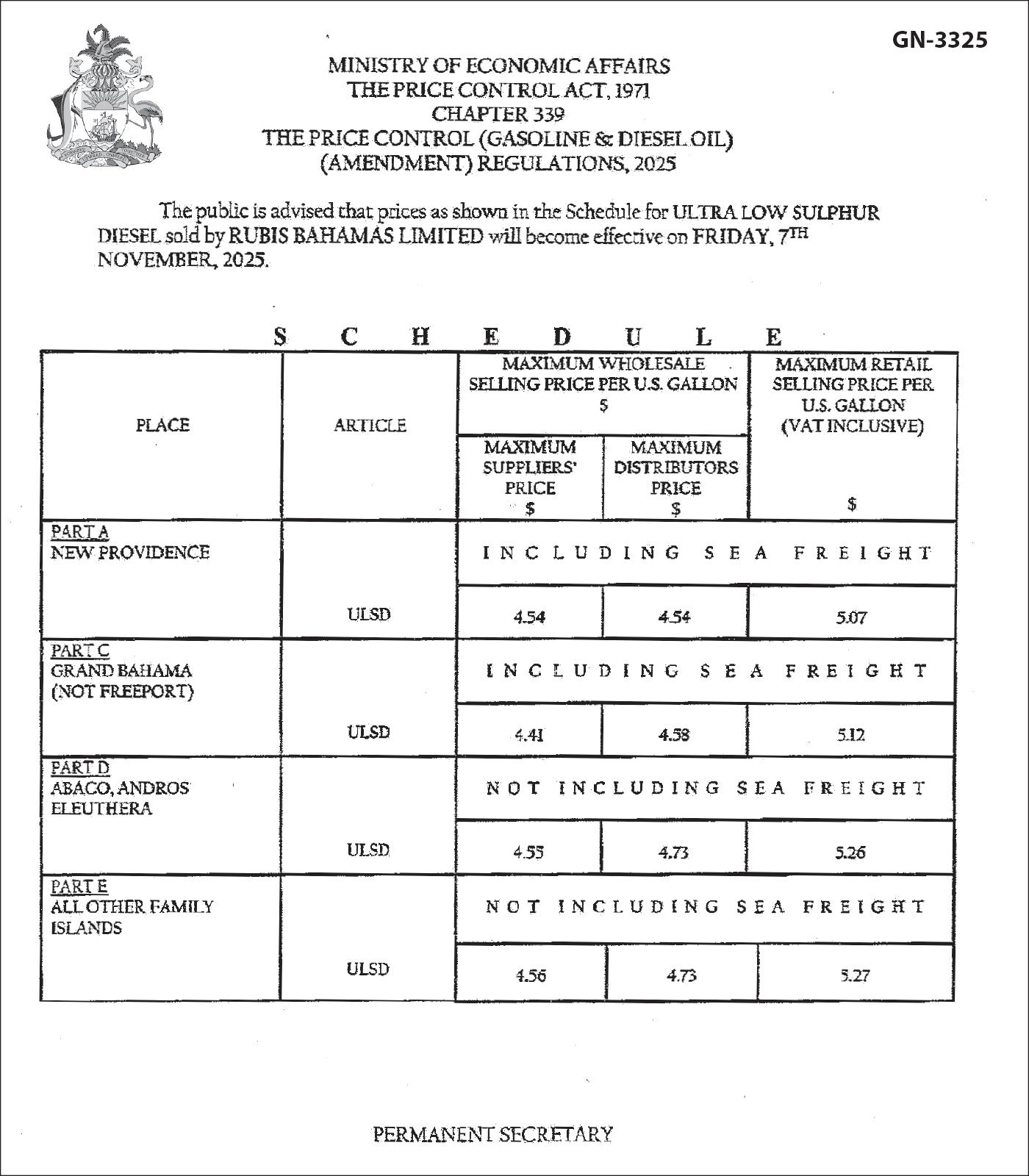
And our courts — the supposed guardians of justice, must wake up. Light sentences for sexual crimes are more than a legal failure; they are a moral disgrace. They tell survivors that their pain is negotiable, their trauma is trivial, and their abuser’s comfort is worth more than their healing. This is not justice. It is betrayal. We demand reform in our justice system. Civilized societies do better. They impose strict penalties on sexual offenders. They invest in victim support systems, counselling, and public education initiatives. They ensure that survivors are not retraumatised in courtrooms. They understand that justice is not only about punishment but also about restoration. We can be that kind of society — but only if we find the will and take action. The time for silence is over. The time for half-measures is gone. It's time for each of us to stand up and make a difference. The time for protecting those in authority should come to an end. It starts with outrage, but it must end with action. Each of us has a role to play. Parents, teach your children respect, not entitlement. Friends,
believe the stories of those who confide in you. Policymakers, strengthen our laws and ensure that justice is not just a word we print on courtroom walls. Families must stop hiding abuse behind closed doors. Neighbours must speak up. The church must stop sending women back into the lion's den. Because one day, the next victim could be someone you love — your daughter, your sister, your son. And by then, all the excuses in the world will not undo the damage. Facing reality, this is not a woman’s issue. It is not a man’s issue. It is a human issue. Men, in particular, have a crucial role to play in challenging the attitudes and behaviours that perpetuate sexual violence. Their voices and actions are essential in creating a society where everyone can live without fear. And until we, as a nation, confront it with the full weight of our moral conviction, we will continue to betray the very values we claim to stand for. The time for silence is over. The time for half-measures is gone. We must all stand together for justice, for dignity, and for the right of every person to live without fear.

Hurricane Melissa shows why everyday Caribbean workers need financial protection
By Chalsey Gill Anthony, Environmental Communicator, on behalf of Caribbean Policy Development Centre (CPDC)
WHEN Hurricane Melissa ripped across the Caribbean, it damaged roads and power lines and disrupted the way thousands of people earn a living. In Jamaica, entire sections of St. Elizabeth, the country’s “breadbasket”, were flooded, threatening food supplies far beyond the parish itself. At one point, more than three-quarters of Jamaica’s electricity customers lost power as the JPS network took a major hit.
Heavy rains and flooding also occurred in Haiti and the Dominican Republic, killing dozens of people, washing out homes, and leaving families without basic resources and services.
These are the kinds of climate shocks our region now faces almost every year.
But the real story unfolds after the storm has passed:
• farmers can’t replant because their pumps, seedlings and investments are gone;
• vendors can’t sell because the market building or electricity is down;
• fishers can’t go out to sea because their boats and docks are destroyed;
• tourism and service workers lose shifts as hotels, ports or tour sites repair storm damages.
One household’s “hidden” loss quickly ripples across entire communities. A farmer’s lost harvest means less produce in the market. A fisher’s broken boat means fewer fish on dinner tables. A vendor’s closed stall means fewer goods available to households. In other words, the livelihood loss of one household quickly becomes the hardship of many. Those are real economic losses. And they fall hardest on the people working informally, the very people our food systems and local markets depend on. National governments are responding. They clear roads, restore power, reopen schools, and, in Jamaica’s case, the Prime Minister outlined immediate relief and early recovery priorities in his October 27 national address about Hurricane Melissa. Shelters were opened across affected communities; evacuation orders were enforced for floodprone areas; and security forces were deployed to maintain order. The government also activated a price-control order to prevent gouging on essential goods, while the Ministry of Agriculture and Fisheries prepared a recommended price list to stabilize markets. J$400 million was allocated for emergency drain-cleaning and constituency mitigation, with additional support to farmers and fishers to help restart production. The Ministry of Labour and Social Security and the JDF were tasked with coordinating
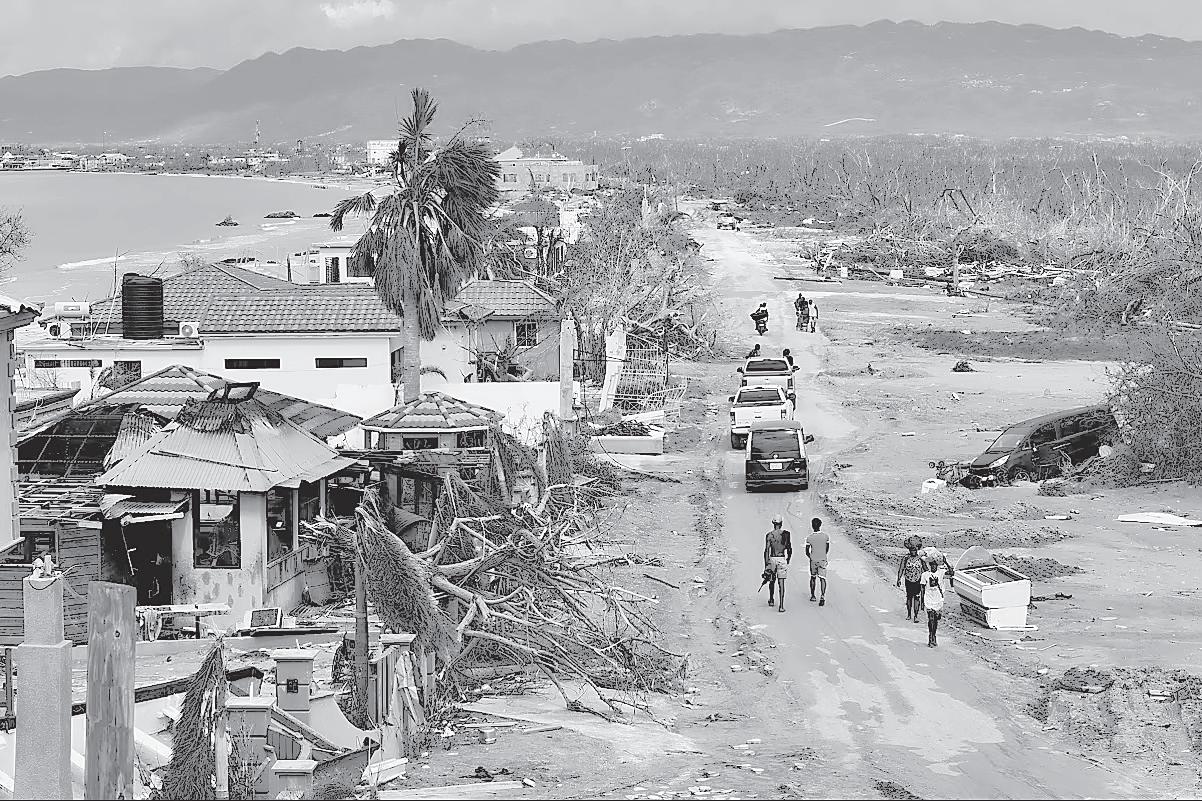
national relief, while the Ministry of Health launched mosquito-control operations to reduce post-storm disease risk. And, importantly, Jamaica’s disaster-risk financing instruments — the National Natural Disaster Risk Fund, the Contingency Fund, and other insurance/ credit instruments — were activated to ensure quick access to response funds.
But even strong national action can’t quickly cover thousands of small, scattered losses, the vehicles that washed away, the market stall roofs that collapsed, the small poultry sheds that drowned, or the weeks of income lost as a result. That gap is exactly what the Caribbean Policy Development Centre (CPDC)’s 2025 research on Climate and Disaster Risk Financing and Insurance (CDRFI) found across five Caribbean countries: 79% of organizations serving vulnerable people had no disaster budget, and 80% weren’t even collecting regular member fees — so when a Melissa-level storm hits, there’s no local pot or social safety net to turn to.
That is why CPDC argues for meso-level CDRFI. It is a model that uses the institutions people already trust (credit unions, cooperatives,
community-based organizations) to deliver money faster and more fairly after a shock. Instead of waiting months for a national programme to reach a disaster-affected area, local community groups could:
• get a quick payout because the storm met a trigger (parametric insurance),
• top it up for people who lost more than the average (indemnity insurance), and
• use its own small reserve to help members restock, repair, or even relocate to keep earning (community savings fund).
This is not a replacement for government aid and resources. We absolutely need big public systems for roads, electricity, ports, hospitals and schools. But Hurricane Melissa showed, again, that people also need a community-level financial shield to protect their income, food supply and dignity while national systems get back up. Last year it was Beryl. This year it’s Melissa. Next year, it will be another name. The climate threat over the Caribbean is now permanent.
The question for the region is: will we keep rebuilding from zero every season, or
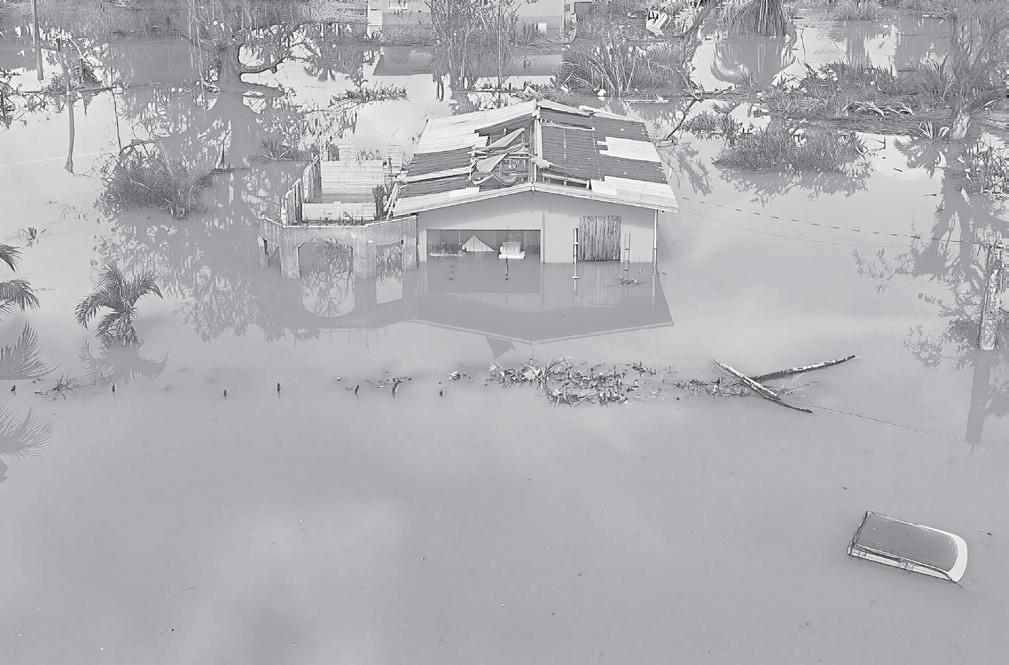
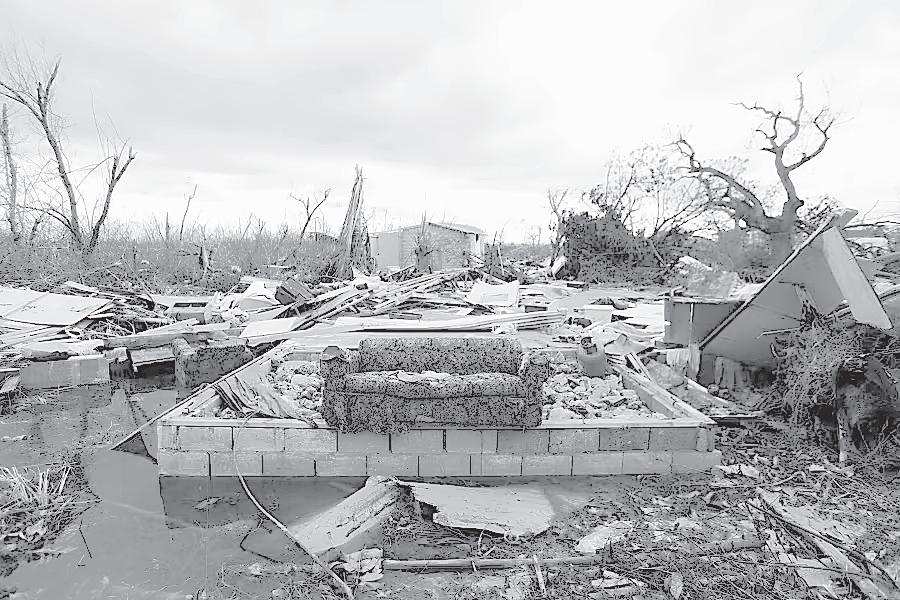
will we build financial systems that let farmers, fishers, vendors, tourism and other informal workers bounce back faster?
Every time families are forced to abandon their livelihoods, the Caribbean loses not only income but also knowledge, traditions, and community strength.
Protecting livelihoods isn’t just about money; it’s about protecting who we are as a people. CPDC has started that conversation with evidence from Antigua and Barbuda, Barbados, Dominica, Grenada and Jamaica. Caribbean media, CSOs, governments and financial cooperatives are invited to
read the research and join the regional discussion on practical, people-centred disaster finance via the CPDC Risk Resilience Hub.
Our region is now at the point where we need to turn disaster lessons, from Hurricane Melissa and every storm before it, into longterm protection.
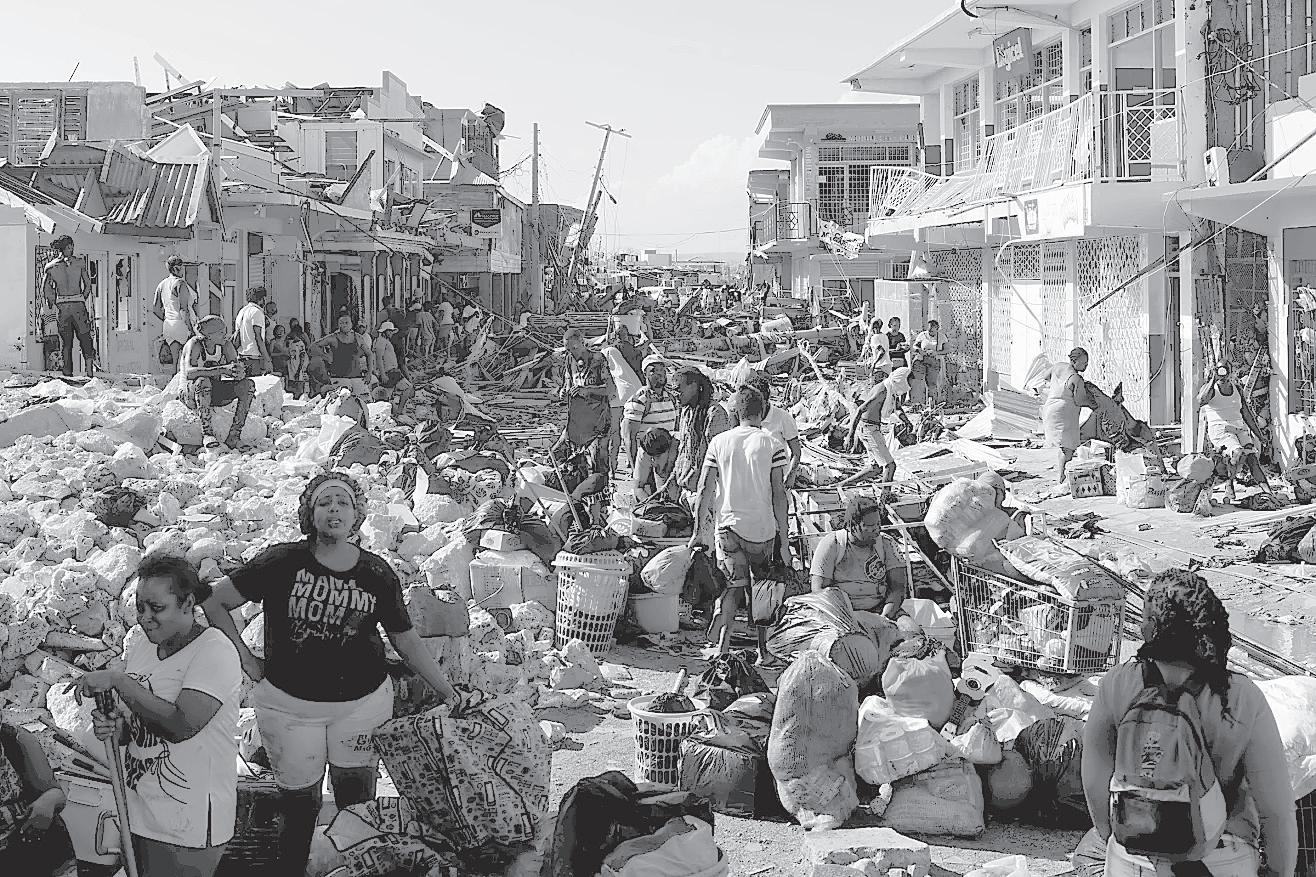

A DRONE image captures residents navigating down a flood-scarred street in Black River, Jamaica, as recovery begins following Hurricane Melissa. Photo: Maria Alejandra Cardona
COMMUNITY members sift through storm-tossed debris in Black River, Jamaica, days after Hurricane Melissa swept the coast.
Photo: Maria Alejandra Cardona
AN AERIAL view shows widespread flooding in St. Elizabeth, Jamaica, after Hurricane Melissa made landfall
HURRICANE Melissa leaves thousands without homes, Black River, Jamaica
Photo: NBC News
Belize Bishop Wright elected Archbishop of region for Anglican Church over Bahamian Bishop Laish Boyd
By KEILE CAMPBELL Tribune Staff Reporter kcampbell@tribunemedia.net
BELIZE Bishop Philip Wright was yesterday elected Archbishop of the Church in the Province of the West Indies, defeating Bahamas Bishop Laish Boyd in a historic vote that made him the first Belizean to lead the regional Anglican Church.
The announcement followed a closed ballot at the 42nd Triennial Provincial Synod, held at Breezes Resort in Nassau, where bishops, clergy, and lay delegates from eight dioceses across the Caribbean voted to fill the vacancy left by Jamaica Archbishop Howard Gregory’s retirement in December.
Bishop Wright, who has led the Diocese of Belize since 2005 and was serving as the province’s acting administrator, said his election was humbling and overwhelming.
“When we start these journeys into ministry, you never imagine a day like this would come,” he said. “It’s overwhelming to know that the members of Synod voted with confidence to give me this opportunity to serve the church in this manner.”
He said his priorities would include strengthening youth engagement and expanding the Church’s use of technology to reinvigorate participation.
“Certainly, by focusing more intentionally on the youth and their participation in the life of the church, and engaging in technology and all of that, could be a way in which we can change the tide,” Archbishop Wright said about declining numbers of church attendees. “Yes, the numbers matter, but what also matters is the quality of ministry we can offer.”
Bishop Boyd, who has served as Bishop of The Bahamas and the Turks and Caicos Islands since 2009, said the election reflected the Anglican Church’s enduring order and tradition. “The Anglican Church has been in this region since the 1600s,” he said, explaining that the House of Bishops nominates two candidates before the Synod votes to determine who will serve as Archbishop. “It’s about service, not competition,” he added. “Our shared responsibility continues: to strengthen the church, nurture our people, and support the new Archbishop in his calling.”
Asked about the ongoing national debate in The Bahamas over members of the gaming industry entering frontline politics, Archbishop Wright
said he had not studied the issue closely but reaffirmed the Church’s long-standing caution about gambling. “The concern has always been about abuse,” he said. “We want to ensure that the viability and thriving of families is attended to, and something like gambling, which potentially can work against that, is certainly something you would caution against.”
The week-long Synod, hosted for the first time in The Bahamas since 2001, drew delegates from across the Caribbean to discuss youth involvement, family life, and the Church’s adaptation to modern communication. Archdeacon Dwight Rolle, chairman of the local organising committee, said hosting the event after 24 years was both challenging and rewarding. “The logistics alone — hosting hundreds of delegates, arranging accommodations, transportation, and sessions — took months of preparation,” he said. “But it’s also a tremendous privilege for our diocese to welcome the province back to The Bahamas.”
During the session, Archbishop Wright confirmed that the province would provide aid to dioceses in Jamaica and neighbouring territories affected by the recent hurricane. “We have bishops and priests from Jamaica who have been giving us a sense of the reality there,” he said. “I am of the mind that this Synod will not close without making some commitment to help our sisters and brothers who have been affected by this enormous hurricane.”
He also paid tribute to the late former Archbishop Drexel Gomez, saying the province was in a “transition in leadership” and expressing gratitude for the foundation laid by his predecessors.
The Anglican Province of the West Indies comprises eight dioceses: The Bahamas and the Turks and Caicos Islands, Barbados, Belize, Guyana, Jamaica and the Cayman Islands, the Northeastern Caribbean and Aruba, Trinidad and Tobago, and the Windward Islands.
Archbishop Wright will serve until retirement, representing the region within the global Anglican Communion.
“We have a lot to do within the church itself in terms of moving things forward,” he said. “But we also want to remain engaged in the wider society and in the matters that affect the lives of all people.”
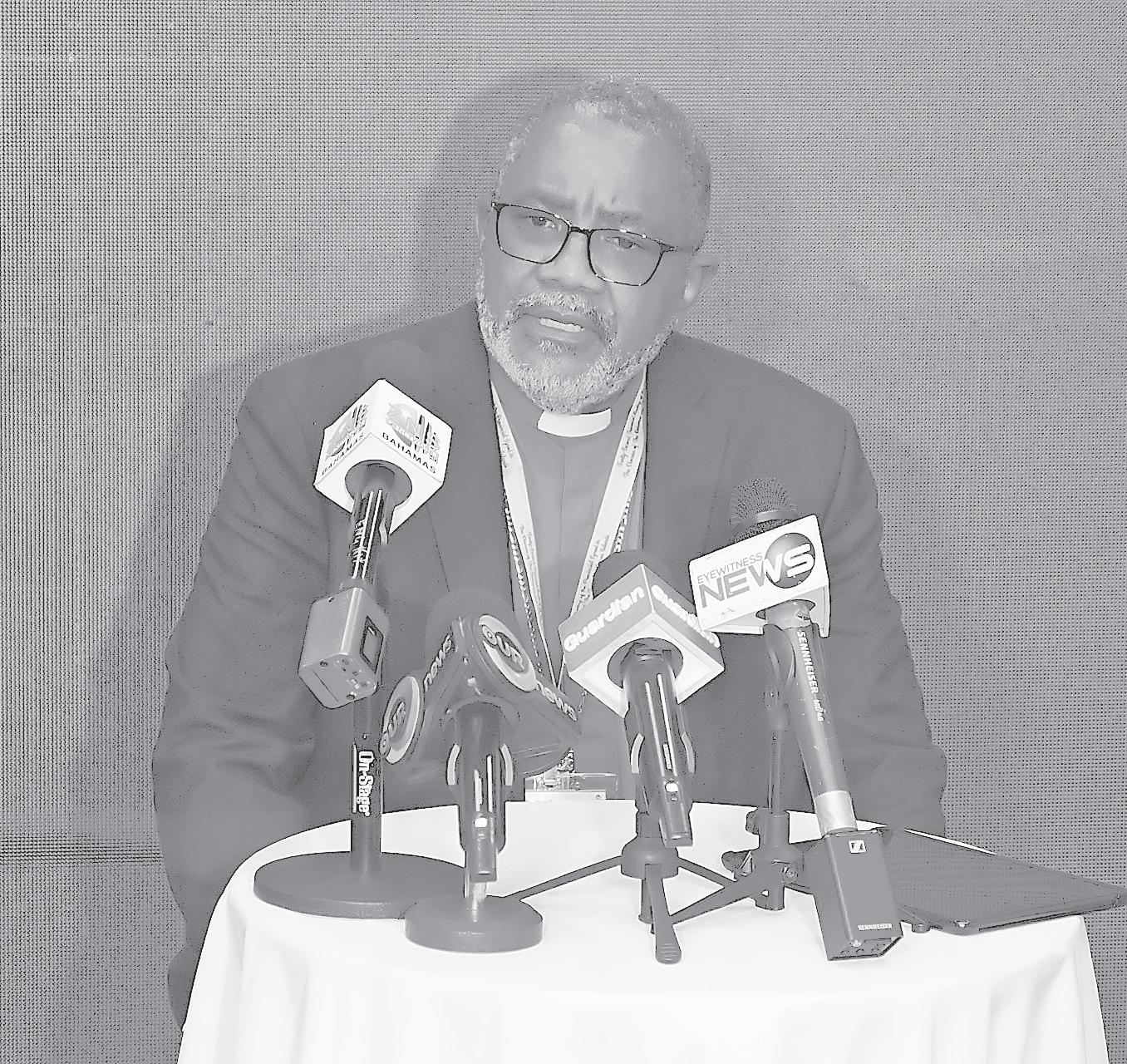
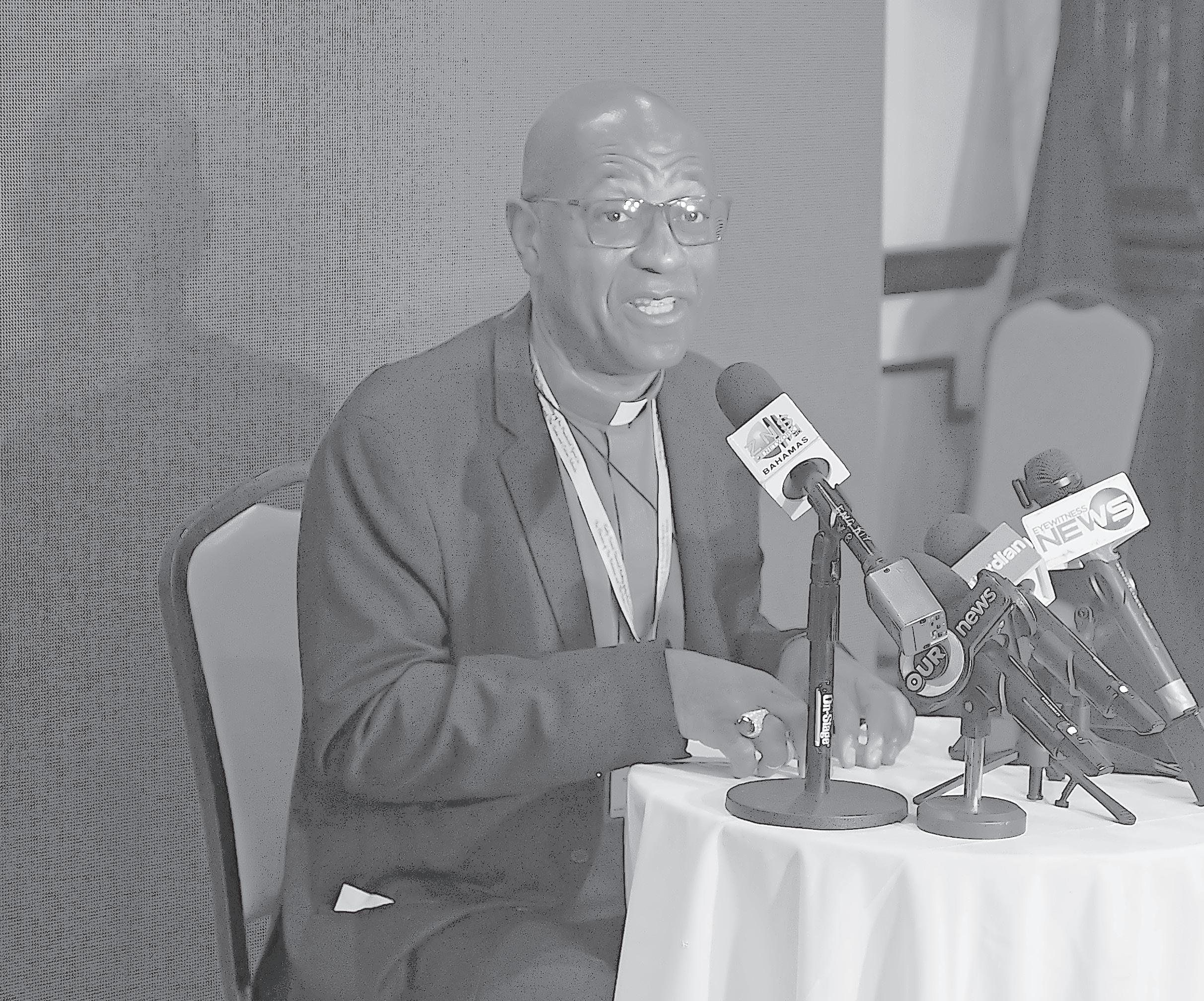



THE CHURCH in the Province of the West Indies newly elected Archbishop Philip Wright speaks to the media at the Caribbean Anglican Synod held at Superclubs Breezes yesterday.
Photos: Nikia Charlton
BAHAMAS Bishop Laish Boyd.
Teenage boy accused of fatal shooting at Arawak Cay
By PAVEL BAILEY Tribune Staff Reporter pbailey@tribunemedia.net
A TEENAGE boy was remanded to prison yesterday after being accused of fatally shooting Philip Lockhart at Arawak Cay last month.
Police allege that 18-yearold Shawntone Davis shot Lockhart, 25, while they were at a bar on Arawak Cay around 1.30am on October 26. Davis is also accused of attempting to kill Errol Collie that same night. Lockhart later died of his injuries at Princess Margaret Hospital. Reports
indicate that one of the men involved in the incident was struck with a blunt object, while another suffered stab wounds.
Davis was charged with murder and attempted murder before Chief Magistrate Roberto Reckley. He was not required to enter a plea, and the matter will proceed to the Supreme Court by voluntary bill of indictment on February 26 2026.
He was remanded to the Bahamas Department of Correctional Services until that date. Donna Major represented Davis, while Chief Superintendent Lakisia Moss prosecuted the case.
FATHER RECALLS LAST TIME HE SAW HIS SON IN MANSLAUGHTER TRIAL
By PAVEL BAILEY Tribune Staff Reporter pbailey@tribunemedia.net
A FATHER yesterday recalled the last time he saw his teenage son alive, as the manslaughter trial into the 2013 shooting death of 18-year-old Sylvester Woodside continued.
Cecil Woodside told the court he last saw his son on Thanksgiving Day in 2013. He said the two spent the holiday together, and his son appeared to be in good spirits. The next day – he was dead and he identified his son’s body at Princess Margaret Hospital’s morgue.
Jadre “Mice” Evans is accused of causing Sylvester Woodside’s death on November 28, 2013, in Jubilee Gardens.
Mr Woodside said he
was accompanied by his brother, who has since died, when he went to the hospital. He spoke there with a doctor and a police officer.
Prosecutors also read into evidence the death certificate of Storm Ferguson, who had been questioned along with Evans in connection with the case. It said Ferguson, 28, died at his home on September 5, 2021, from a seizure.
A police officer previously testified that Ferguson was arrested alongside Evans on December 1, 2013.
Damien White represents Evans, while Gary Rolle, Danielle Capron, and Tabitha Frazer represent the Crown. Justice Guillimina Archer-Minns presided.
Man must pay $200k fine or face five years prison
By PAVEL BAILEY Tribune Staff Reporter pbailey@tribunemedia.net
A MAN was ordered to pay a $198,000 fine or face five years in prison after admitting yesterday to possessing $207,000 worth of drugs and 20 rounds of ammunition at his Atlantic Drive home.
Police said 33-year-old Devin Symonette was found with 87lbs of marijuana, 51 marijuana edibles, 24 vape pens, one ounce of psilocybin mushrooms, 20 .40 rounds of ammunition, and a black .40 extended magazine during a K-9 assisted search of his residence around 11am on November 5. The drugs seized had an
estimated street value of $207,000.
Symonette pleaded guilty to possession of ammunition, possession of a component part of a firearm, and four counts of possession of dangerous drugs with intent to supply before Chief Magistrate Roberto Reckley. He was fined $198,000, including $20,000 for the ammunition charge, or face a five-year prison term if he fails to pay. The $5,507 confiscated during the drug bust was ordered forfeited to the Crown.
Ian Cargill and Ryszard Humes represented Symonette, while Chief Superintendent Lakisia Moss prosecuted the case.
Man injured in East Hill Street shooting incident
A 21-YEAR-OLD man was shot and injured early Monday morning after gunmen opened fire on his vehicle near East Hill Street.
The victim was struck in his right arm. The suspects sped off heading south on Market Street.
He drove himself to hospital, where he is in stable condition. His two companions were not injured.
Police said the victim had parked his white Chevrolet Cruze shortly after 3am to speak with an acquaintance while accompanied by a man and a woman when a grey Jeep pulled alongside them and its occupants began shooting.


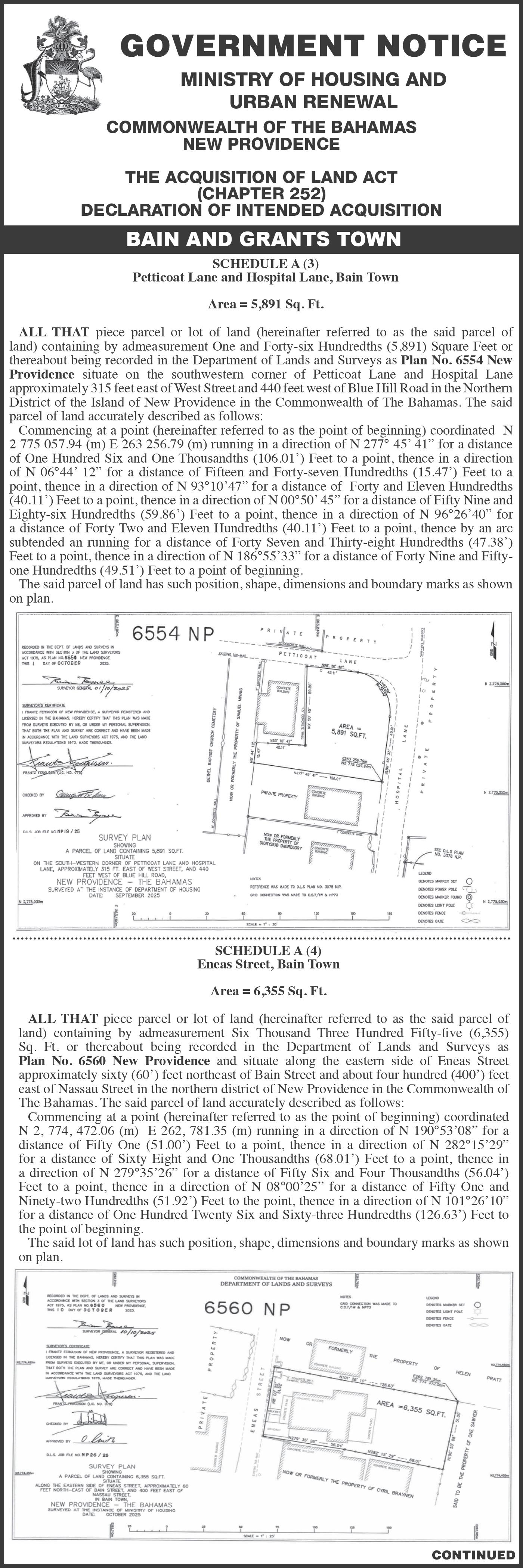
NEW SURVEY FINDS 75 PERCENT CONCERNED OVER IMPACT OF PLANNED SEAWALL IN EXUMA
A NEW survey has found that the vast majority of people are concerned about the impact of a seawall planned in Exuma – with 75% of those questioned worried about its impact on erosion and water quality.
The Organisation for Responsible Governance Exuma Cays Community Survey sheds light on community concern over the 390’ seawall that is part of a plan put forward by the Yntegra Rosewood development project in Sampson Cay.
The proposed plan for the Yntegra Rosewood development has been approved by the Department of Environmental Protection and Planning (DEPP) to install a massive seawall in an environmentally sensitive bay on the north end of Sampson Cay.
According to the survey, the seawall was approved without any publicly disclosed analysis of the impact on the surrounding environment. It is claimed the seawall will impact the coastal and marine environment by changing currents, significantly blocking tidal flows, and causing erosion on nearby beaches.
In addition to the seawall fears, 72% of the local community members who participated in the survey expressed concern about plans for dredging that would be detrimental to the existing healthy seagrass, coral and juvenile conch.
Participants from the Staniel Cay and Blackpoint communities, that neighbour the Yntegra development, were nearly unanimous (96.8%) in saying that protecting seagrass, reefs, marine life, beaches and clean water is extremely important to them.
The Save Exuma Alliance (SEA) welcomed the survey, saying: “The people have spoken. A seawall here is a hard ‘no’. This survey has found what really matters to people, is to protect the environment we depend on. This is not just a narrow majority, this is what most people care about, and we should listen to their concerns.”
SEA has long supported development in the Exumas and requiring that they adhere to sustainable developments that are appropriate for the location, a view the Exuma
community agrees with.
The survey found that 65.3% of locals prefer small, low-impact eco-resorts designed to minimise environmental impact, with sustainable operations such as solar power over mid-sized resorts requiring destructive methods such as dredging. Simply put, people prefer projects with a lighter footprint.
SEA said: “The scientists have had their say on the dangers of this project are. Neighbouring businesses have spoken out and now the local residents have added their voices. Across the board, there is concern about this project – especially the seawall and the dredging. It is not too late to change course, and to proceed with a project that fits the surrounding environment rather than destroying it. If so many voices are against this plan, what more does it take for officials to listen?”
Protestors claim the Yntegra Rosewood plan for a seawall and dredging in the North Bay will directly impact a 176-acre seagrass meadow – roughly the equivalent of 100 professional soccer fields.
In a recent interview, Deputy Prime Minister Chester Cooper told travel news and market research website Skift Research that businesses that did harm to the environment would have no place in The Bahamas, saying: “If you are prepared to do quality business in a sustainable, environmentally friendly way, we welcome you. And if you plan not to conform, there’s no place for you.”
A series of environmentalists have welcomed Mr Cooper’s words – including Joseph Darville, chairman of Waterkeepers Bahamas, who last week called for Yntegra to be prevented from dredging in the area. SEA applauds Mr Cooper too, and asks for those words to be put into action.
The Save Exuma Alliance is a coalition of community leaders, local business owners, and residents of the Exuma Cays working to safeguard Exuma’s unique ecosystems and quality of life from unsustainable development.
SEA has also launched a petition to halt environmental clearance for the Rosewood/Yntegra project, which has been signed by nearly 7,000 people.


Trump threatens to sue BBC over edited speech that sparked resignations by news bosses
By JILL LAWLESS Associated Press
US President Donald Trump has threatened legal action against the BBC over the way a speech he made was edited in a documentary aired by Britain’s national broadcaster.
BBC chairman Samir Shah on Monday apologized for the “error of judgment,” which triggered the resignations of the BBC’s top executive and its head of news.
Director-General Tim Davie and news chief Deborah Turness quit Sunday over accusations of bias and misleading editing of a speech Trump delivered on Jan. 6, 2021, before a crowd of his supporters stormed the Capitol in Washington.
The hourlong documentary — titled “Trump: A Second Chance?” — was broadcast as part of the BBC’s “Panorama” series days before the 2024 US presidential election. It spliced together three quotes from two sections of the 2021 speech, delivered almost an hour apart, into what appeared to be one quote in which Trump urged supporters to march with him and “fight like hell.” Among the parts cut out was a section where Trump said he wanted supporters to demonstrate peacefully.
Shah said the broadcaster accepted “that the way the speech was edited did give the impression of a direct call for violent action.”
A letter from Trump attorney Alejandro Brito demands the BBC “retract the false, defamatory, disparaging, and inflammatory statements,” apologize and “appropriately compensate President Trump for the harm caused,” or face legal action for $1 billion in damages.
The BBC said it would review the letter “and respond directly in due course.”
Top executives quit
Trump had earlier welcomed the resignations of the two BBC executives. He posted a link to a Daily Telegraph story about the speech-editing on his Truth Social network, thanking the newspaper “for exposing these Corrupt ‘Journalists.’ These are very dishonest people who tried to step on the scales of a Presidential Election.” He called that “a terrible thing for Democracy!”
In a resignation letter to staff, Davie said: “There have been some mistakes made and as director-general I have to take ultimate responsibility.”
Turness said the controversy was damaging the BBC, and she quit “because the buck stops with me.” She defended the organization’s journalists against allegations of bias.
“Our journalists are hardworking people who strive for impartiality, and I will stand by their journalism,” she said Monday. “There is no institutional bias. Mistakes are made, but there’s no institutional bias.”
Trump speech edited Pressure on the broadcaster’s top executives has been growing since the right-leaning Daily Telegraph published parts of a dossier compiled by Michael Prescott, who had been hired to advise the BBC on standards and guidelines.
As well as the Trump edit, it criticized the BBC’s coverage of transgender issues and raised concerns of anti-Israel bias in the BBC’s Arabic service. The “Panorama” episode showed an edited clip from the January 2021 speech in which Trump claimed the 2020 presidential election had been rigged. Trump is shown saying: “We’re going to walk down to the
Capitol and I’ll be there with you. And we fight. We fight like hell.”
According to video and a transcript from Trump’s comments that day, he said: “I’ll be there with you, we’re going to walk down, we’re going to walk down. Anyone you want, but I think right here, we’re going to walk down to the Capitol, and we’re going to cheer on our brave senators and congressmen and women, and we’re probably not going to be cheering so much for some of them.
“Because you’ll never take back our country with weakness. You have to show strength and you have to be strong. We have come to demand that Congress do the right thing and only count the electors who have been lawfully slated, lawfully slated.
“I know that everyone here will soon be marching over to the Capitol building to peacefully and patriotically make your voices heard.”
Trump used the “fight like hell” phrase toward the end of the speech, but without referencing the Capitol.
“We fight like hell. And if you don’t fight like hell, you’re not going to have a country anymore,” Trump said.
In a letter to Parliament’s Culture, Media and Sport Committee, Shah said the purpose of editing Trump’s words had been “to convey the message of the speech” so that viewers could understand how it had been received by Trump’s supporters and what was happening on the ground.
He said the program had not attracted “significant audience feedback” when it first aired but had drawn more than 500 complaints since Prescott’s dossier was made public.
Shah acknowledged in a BBC interview that “it would have been better to have acted earlier. But we didn’t.”
A national institution
The 103-year-old BBC faces greater scrutiny than other broadcasters — and criticism from its commercial rivals — because of its status as a national institution funded through an annual license fee of 174.50 pounds ($230) paid by all households who watch live TV or any BBC content.
The broadcaster is bound by the terms of its charter to be impartial, and critics are quick to point out when they think it has failed. It’s frequently a political football, with conservatives seeing a leftist slant in its news output and some liberals accusing it of having a conservative bias.
It has also been criticized from all angles over its coverage of the Israel-Hamas war in Gaza.
In February, the BBC removed a documentary about Gaza from its streaming service after it emerged that the child narrator was the son of an official in the Hamas-led government. Governments of both left and right have long been accused of meddling with the broadcaster, which is overseen by a board that includes both BBC nominees and government appointees.
Some defenders of the BBC allege that members of the board appointed under previous Conservative governments have been undermining the corporation from within.
Prime Minister Keir Starmer’s spokesman, Tom Wells, said the centre-left Labour Party government supports “a strong, independent BBC” and doesn’t think the broadcaster is biased.
“But it is important that the BBC acts to maintain trust and corrects mistakes quickly when they occur,” he said.

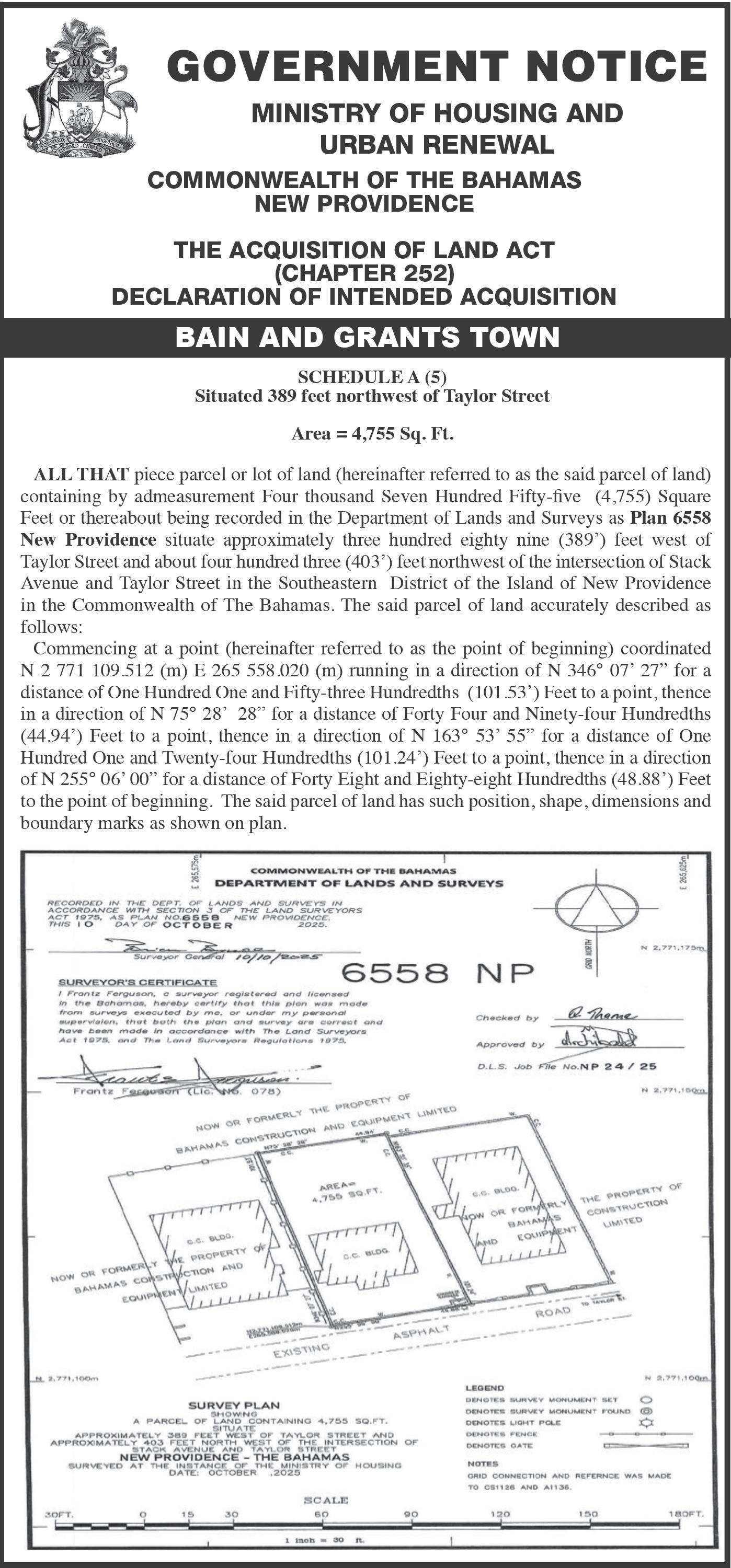
STAFF arrive at BBC Broadcasting House in London, yesterday.
Photo: James Manning/PA/AP
Arctic air hits much of the US, bringing snow to some areas and very chilly temperatures to Florida
By SAFIYAH RIDDLE and MIKE SCHNEIDER Associated Press
SOME of this autumn’s coldest weather yet is bearing down on the United States, enveloping the eastern two-thirds of the country with Arctic air on Monday and affecting millions of people.
National Weather Service forecasters said the weather could bring record low temperatures in the US Southeast, including all of Florida, where temperatures in parts of the state
were near 80 degrees (27 C) just a day ago. The cold air brought gusty wind and red flag warnings in the Great Plains on Monday, and forecasters said the Great Lakes and Appalachian Mountain regions could see 4 inches (10 centimetres) to 8 inches (20 centimetres) of snow.
Around Lake Erie, forecasters warned of possible lake-effect snow, where copious amounts can fall in relatively narrow bands, drastically increasing snowfall near the water while
leaving other nearby areas untouched.
Cold weather warnings were issued for Ohio, West Virginia and Kentucky, with freezing temperatures predicted for a large swath farther south, from Texas and Oklahoma to Alabama and Georgia.
Chill could cause falling iguanas in Florida
In Florida, forecasters said wind chills could dip to the 30s (minus 1 C). Whenever it gets that cold in the Sunshine State, many look to the trees: Iguanas,

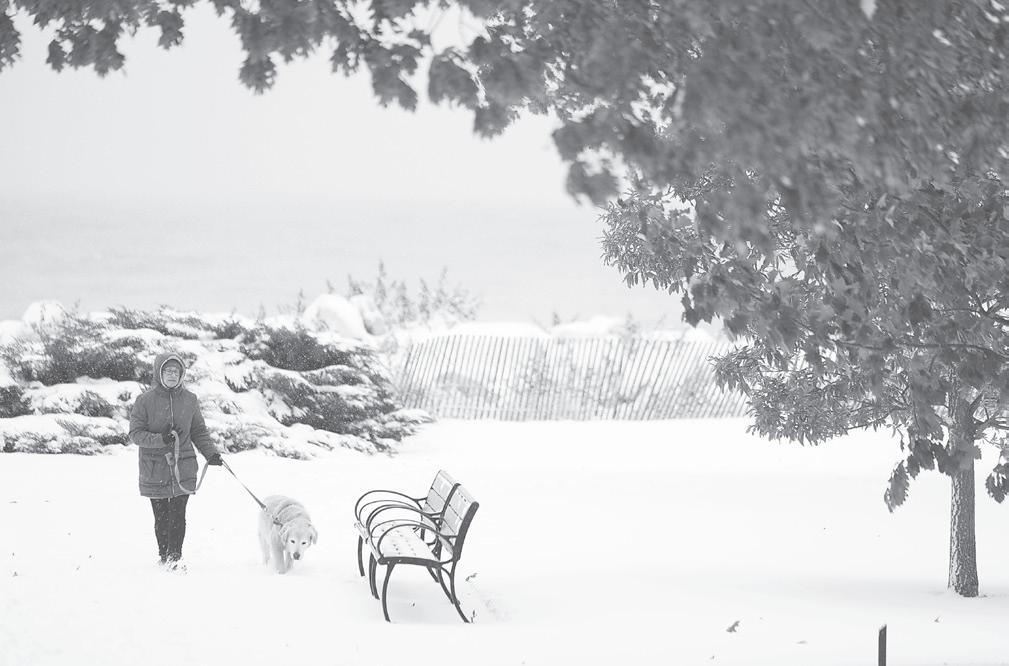
Photo: Kiichiro Sato/AP
an invasive reptile species, have previously gone into a sort of suspended animation and fallen to the ground when temperatures dip below 40 degrees (4 C). They usually wake up with the sun’s warmth — although it is unclear whether any of the reptiles will tumble from the treetops this time.
Across the south, many local governments opened heated shelters for residents struggling to cope with the cold.
Those resources are invaluable in St. Louis, Missouri, where some people are still waiting for essential repairs on their houses after a powerful EF3 tornado ripped through the region in May.
City officials announced Monday that emergency shelters would be open for homeless people as well as those who still dealing with the aftermath.
Hazardous conditions for road travel
In Tennessee, temperatures dropped to 30 (minus 1 C) into Sunday morning, and areas with higher elevation in the eastern part
of the state reported that 3 inches (7.6 centimetres) of new snow had fallen by 9 a.m., causing some school closures. Snow-slickened roads led to a crash involving multiple vehicles and about an hourlong shutdown on westbound Interstate 40 in Putnam County, east of Nashville, the county sheriff’s office announced.
Further north, as temperatures dropped across the nation’s midsection, meteorologists warned of hazardous travel conditions through winter weather advisories for Michigan, Indiana and Wisconsin.
Snow fell Sunday in Michigan’s Upper Peninsula, where meteorologists warned of low visibility with up to a foot (30 centimetres) of snow by Monday.
In Indiana, weather experts predicted up to 11 inches (28 centimetres) of snow and “slippery surfaces” for road travel. Up to 6 inches (15 centimetres) of snow were predicted in parts of Wisconsin.
“Patchy blowing snow” and wind chills hovering near freezing were
expected in portions of Minnesota, Nebraska and South Dakota. Some areas got measurable fluff a day earlier, including 4 inches (10 centimetres) of snow in southwest Minnesota and more than 5 inches (13 centimetres) in northern Iowa. Gardeners, the growing season has now ended Weather experts issued special guidance for gardeners in the Midwest and northeast, saying the freeze warning means the growing season has ended.
“Take steps now to protect tender plants from the cold,” warned meteorologists in Arkansas. Growers of peppers, eggplants, squash and leafy greens in north Florida were harvesting as much as they could on Monday and preparing irrigation lines to make sure they don’t freeze up and crack.
South Florida, where most of the state’s winter fruits and vegetables are grown, was expected to be spared any freeze based on the current forecast. Citrus, Florida’s best-known crop, also was expected to dodge a hit since citrus trees typically sustain damage only when the thermometer drops below 28 degrees (minus 2.2 C).
“The freezing temperatures are likely to miss our major growing regions for fruits and vegetables,” said Christina Morton, a spokeswoman for the Florida Fruit & Vegetable Association.
The cold snap may have a sweet side: As long as temperatures stay above freezing, some Florida crops such as strawberries and blueberries could benefit because cool weather enhances their taste and quality, Morton said.
AFTER MISTAKEN DEPORTATION, US ASKS JUDGE TO LET IT SEND KILMAR ABREGO GARCIA TO LIBERIA

GREENBELT Associated Press
US government attorneys say they have cleared all the hurdles needed to send Kilmar Abrego Garcia to Liberia and are asking a federal judge to dissolve an order blocking his deportation.
Abrego Garcia’s mistaken deportation to his home country of El Salvador earlier this year has helped galvanize opposition to President Donald Trump’s immigration policies. His attorneys claim the administration is now manipulating the immigration system in order to punish him for successfully challenging that deportation.
A motion from the government filed in US District Court in Maryland late on Friday says officials have received assurances from Liberia that Abrego Garcia would not face persecution or torture there. Further, it says an immigration officer heard Abrego Garcia’s claims that he feared deportation to the West African nation, but ruled against him.
His attorneys argue in a separate Friday filing that Abrego Garcia has already designated Costa Rica as a country where he is willing to be deported. They claim the government now must send him there. The fact that officials continue to pursue deportation
to other countries is evidence that the process is retaliatory and violates due process protections, they argue.
Abrego Garcia has an American wife and child and has lived in Maryland for years, but he immigrated to the US illegally from El Salvador as a teenager. In 2019, an immigration judge granted him protection from being deported back to his home country, finding he faced danger there. But in March, he was deported to El Salvador anyway in what a government attorney later said was an administrative error. Facing pressure from the courts, the administration brought him back to the US in June but has since been pursuing his deportation to a third country.
Much of Abrego Garcia’s argument against his deportation to Liberia hinges on due process claims. The government tries to tear down those claims, arguing that his due process rights are not the same as a US citizen’s. Because he entered the country illegally, he should be treated the same as someone who just crossed the border, they argue.
Meanwhile, his attorneys argue that “’aliens who have established connections in this country’ have greater due process rights than ‘an alien at the
threshold of initial entry’,” citing a 2020 US Supreme Court case.
As part of his due process rights, his attorneys also say he is entitled to have an immigration judge review the immigration officer’s determination that Abrego Garcia is unlikely to be persecuted or tortured in Liberia. They argue the officer should have considered the fact that Liberia could re-deport Abrego Garcia to El Salvador. And they say the Liberian government has only agreed to accept him on a temporary basis.
Government attorneys say they have assurances from Liberia that the Secretary of State deems sufficient. The court cannot second-guess that conclusion because that would mean intervening in foreign diplomacy, the domain of the executive branch, they argue.
“This Court should therefore dissolve its preliminary injunction and permit Petitioner to be removed to Liberia,” they state.
Separately, Abrego Garcia faces human smuggling charges in federal court in Tennessee. He has pleaded not guilty and asked the judge to dismiss the case, claiming the charges are the result of “selective or vindictive prosecution.” A hearing on that motion is set for December 8.
A PERSON walks her dog along Lake Michigan as snow covers the ground with fall colors on the trees in Evanston, Illinois, a suburb of Chicago, yesterday5.
KILMAR ABREGO GARCIA attends a protest rally at the Immigration and Customs Enforcement field office in Baltimore, August 25, 2025, to support Abrego Garcia. Photo: Stephanie Scarbrough/AP
